- Click Here for Complete Story
Secret detentions in the "war on terror"
Imagine that one minute you are eating dinner with your family and the next you are hooded, handcuffed, and dragged away. Your family is not told where you were taken. After your initial interrogation, you are taken to a plane: it takes off, but no one tells you where it’s going and when it lands you don’t even know what country you’re in.
You are put in a cell, completely isolated, with no windows and only a bucket for a toilet. Artificial lights are on all the time and a constant low-level hum comes out of the loudspeakers. You cannot sleep and feel very anxious. The guards, dressed completely in black, communicate only with hand gestures. Interrogators insult you about the things most sacred to you and make you stand motionless for long periods of time. You feel like you are going mad and just want this to stop. And to make matters worse, you still haven’t been told why you are there, nor are you allowed to speak to a lawyer or your family. No one knows where you are.
You may have to imagine such a situation, but someone like Muhammad al-Assad has actually lived through similar experiences.
- Click Here for Complete Story
- Secret Detention in CIA "Black Sites"
- Detention by proxy: arrests in Indonesia, Jordan and Tanzania
- Transferred to US custody
- "Black site" detention
- Torture, ill-treatment and "disappearance": violations of international law
- Arbitrary detention in Yemen under US direction
- Recomendations
Refugee story torpedoed by PM's taskforce
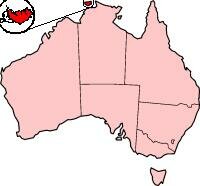 The Federal Government has admitted its blunt assertion that 14 Kurdish boat people had not sought asylum was wrong and should never have been made.
The Federal Government has admitted its blunt assertion that 14 Kurdish boat people had not sought asylum was wrong and should never have been made.
In an embarrassing backdown, the people-smuggling taskforce that masterminded the Government's response to the arrival of the Kurdish boat off Melville Island said the men had, in fact, sought sanctuary in Australia.
The taskforce's report into the arrival of the vessel, Minasa Bone, torpedoes the claims by the Immigration Minister, Amanda Vanstone, and Foreign Minister, Alexander Downer, that the 14 men had not claimed asylum.
It says the "unauthorised arrivals" had repeatedly stated their desire to land and live in Australia. This included statements that "we are from Turkey, don't want to go back, no good. We want to go to Australia."
One man had brandished an English-Turkish dictionary and pointed to the word "refugee". Others had claimed to be Kurdish refugees and that they wanted to go to Australia because Turkey was "no good".
- Click Here for Complete Story
Brazil's juvenile prisons fail young people
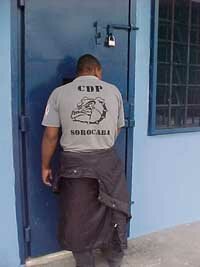 A guard from the adult prison service locks the door on the punishment cell in the Vila Maria juvenile detention centre, São Paulo, Brazil, 2005 © Promotoria de Justiça da Infância e da Juventude de São Paulo – Setor de Execuções
A guard from the adult prison service locks the door on the punishment cell in the Vila Maria juvenile detention centre, São Paulo, Brazil, 2005 © Promotoria de Justiça da Infância e da Juventude de São Paulo – Setor de Execuções
Torture, ill-treatment and collective punishment are part of daily life for the 6,000 detainees of São Paulo’s juvenile detention centre, the State Foundation for the Well Being of Minors (FEBEM).
In September 2005 the mother of M., an adolescent in the Vila Maria unit of FEBEM, reported that her son had been so severely beaten by wardens that he was urinating blood. Another imprisoned juvenile, D., showed his mother bruising and signs of torture. He told her that the FEBEM director had personally ordered that his food be withheld. He was kept for four days in solitary confinement, after being dragged out of class by a guard who shot five times into the ceiling to intimidate him.
The FEBEM states its objective is to rehabilitate young offenders through education to enable them to reintegrate into society. Yet detainees receive little, if any, educational support. Detention conditions are frequently inhuman and riots and violence between detainees are rife.
- Click Here for Complete Story
Nepal: Fear of torture/fear of "disappearance"
Krishna Gopal Ghimire (m), age 50, farmer
Krishna Gopal Ghimire was arrested at his home in Municipality Ward No 4, Sunsari District, by a group of six armed men in plain clothes believed to be security forces personnel, at about 11pm on 28 October. He is believed to be detained at the Regional Headquarters of the Royal Nepal Army (RNA) in Itahari. The army have denied all knowledge of his arrest, and there are fears that he may be tortured or "disappear". Krishna Gopal Ghimire and his family were apparently at home asleep when the men, armed with pistols, came into the house and began to search it. They reportedly then arrested Krishna Gopal Ghimire and told his wife and family that he would be released the following morning.
He did not return home next day, and his family went to make inquiries at the Area Police Office and the RNA's Regional Headquarters in Itahari, Sunsari District. Both the police and army officers they spoke to denied any knowledge about the arrest of Krishna Gopal Ghimire.
- Click Here for Complete Story
Faith, hope and Kerobokan
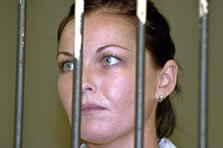 After 12 months of broken promises and shattered dreams, Schapelle Corby reveals why she still believes in miracles. Paul Toohey reports.
After 12 months of broken promises and shattered dreams, Schapelle Corby reveals why she still believes in miracles. Paul Toohey reports.
Paul, in his epistles to the Romans, set down some of the Bible’s most powerful and lasting exhortations. Schapelle Corby’s favourite is Chapter XII, Verse 2. She recites: "Be not conformed to this world but be transformed by the renewing of your mind." What does it mean? "It means you can be born again," says Corby. "That’s how I read it."
Romans XII is a short chapter made up of 21 sentence-long verses. It is not surprising that Corby has honed in on this part of the Bible during her ordeal, which last week passed the 12-month marker. It is the home of the familiar "Vengeance is mine, saith the Lord" line. It is also a call for brotherly love, and argues that judgment is not a right of humans. Those who would judge bring ruin and condemnation upon themselves.
So what about those judges who sentenced her to 20 years in prison? Romans XII has an answer for that: "Bless those who persecute you."

- Click Here for Complete Story

- Downer torpedoed Corby jail deal: Hotman
- Convicted Australian drug smuggler to file appeal
- Indonesian court cuts Corby jail term by five years: lawyer
- Schapelle Corby's jail term cut
- Corby to fight drug sentence
- Corby lawyer plans new appeal
More Than 1,100 Imprisoned in Burma
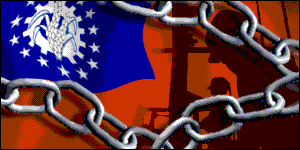 The United Nations reports the government of Burma continues to imprison more than 1,100 (eleven hundred) political prisoners, including Nobel peace laureate and pro-democracy leader, Aung San Suu Kyi.
The United Nations reports the government of Burma continues to imprison more than 1,100 (eleven hundred) political prisoners, including Nobel peace laureate and pro-democracy leader, Aung San Suu Kyi.
A report delivered by a UN human rights envoy to the General Assembly documented forced labor, sexual violence, extortion and expropriation committed by troops in the ruling military junta. Meanwhile, outside the United Nations several Burmese pro-democracy activists have entered the thirteen day of a hunger strike.
This is Burmese refugee, Han Lin: "It is time that the United Nations to take effective action against the Burmese brutal military regime.
It is time. We Burmese people cannot be suffering anymore because the real situation in Burma gets worse."
- Click Here for archive of Story
Federal police knew all about Bali nine
 Nine days before nine young Australians were arrested in a heroin smuggling sting in Bali, Australian police knew almost everything: who they were, where they would stay, when they would try to leave, even how they would strap the drugs to their bodies.
Nine days before nine young Australians were arrested in a heroin smuggling sting in Bali, Australian police knew almost everything: who they were, where they would stay, when they would try to leave, even how they would strap the drugs to their bodies.
It was a crime not yet committed but with terrible consequences if it was discovered in Indonesia: the death penalty.
Yet on April 8, the Australian Federal Police wrote to their Indonesian counterparts outlining in extraordinary detail what would take place. They named the alleged ringleader, Andrew Chan. And they told the Indonesians: "If you suspect Chan and/or the couriers are carrying drugs at the time of their departure, please take whatever action you deem necessary."
The Indonesians did. On April 17, Chan and four others were arrested at Denpasar Airport.
Scott Rush, Michael Czugaj, Renae Lawrence and Martin Stephens had heroin strapped to their bodies. Another four, Myuran Sukumaran, Tach Duc Thanh Nguyen, Si Yi Chen and Matthew Norman, were arrested soon after at a Bali hotel. All nine are now on trial.
Rather than waiting to grab the suspects in Sydney, Australian officers did not try to stop Indonesian police from arresting the group, the letters suggest. Rush and Lawrence accuse the AFP of exposing them to the death penalty and have taken legal action against them in Darwin.

- Click Here for Complete Story

- No Bali Nine apologies: AFP
- AFP under scrutiny for handling of Bali Nine
- Last of the Bali Nine begins trial
- Bali nine sweat it out as their fates are decided
- Contrasts as Bali 9 face fate
- Drug trials open for 'Bali 9'
- Adjournments, delays mar Bali 9 trials
- Bali 9 on trial

- Trials adjourned for Bali nine pair
- Bali 9 documents lay out alleged conspiracy
- Bali 9 files
- Father alerted police about Bali Nine
- Bali nine families fight back
FPSS Member appeals to Indonesian President on behalf of Bali Nine
Attention: President Susilo Bambang Yudhoyono Istana Merdeka, Jakarta 10110, Indonesia
Your excellency
I write to you as an Australian citizen residing in New Zealand and also as a concerned member of Amnesty International Urgent Action Group – which is an impartial organisation working on behalf of prisoners of conscience, against the death penalty, torture, political killings and disappearances.
- Click Here to read complete letter to President

- What are we doing to our children?
Syria: Women held in underground cells
Heba al-Khaled, aged 17, and her sister Rola al-Khaled, 20, both of whom are pregnant, along with Nadia al-Satour and her young baby, are being held by the Syrian authorities in tiny underground cells in the Military Intelligence Palestine Branch, in Damascus.
The cells, known as “tombs”, are infested with cockroaches and other insects as well as rats, which sometimes bite prisoners. The three young women are being held incommunicado in solitary confinement in order to put pressure on their husbands, alleged members of the Islamic armed group Jund al-Sham.
- Click Here for Complete Story
Hmong - Apocalypse Now
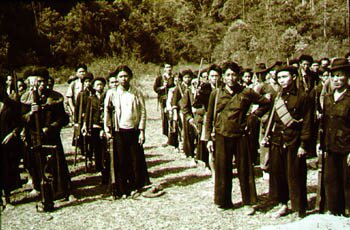 TRIBESMAN (Translation): Today the Lao government is trying to use starvation as a weapon to kill us. They are also using chemicals to kill us.
TRIBESMAN (Translation): Today the Lao government is trying to use starvation as a weapon to kill us. They are also using chemicals to kill us.
This extraordinary video testimony was shot by Hmong tribespeople in the remote mountains of northern Laos. Smuggled out at great risk, it is the first time it's been seen on television anywhere. It reveals the desperate plight of the Hmong who are hiding in jungle sanctuaries, totally cut off from the outside world. For over 30 years they have been trying to survive as hunter gatherers while the Lao Government hunt them like wild game.
TRIBESMAN (Translation): They have been hunting us and killing us for 30 years, today there are 20,000 of us in the jungle. The Hmong had fought on the American side in their war against the communists in Vietnam, Cambodia and Laos. When the Americans withdrew in 1973 they left their allies, the Hmong, behind. But the people they were fighting against, the communist Pathet Lao, became the Government in Laos and have relentlessly pursued the Hmong ever since. Driven by starvation and constant attacks from the Lao military, tribal leaders have now taken a momentous decision. They are sending out an advance party of women and children to surrender and try to save their lives.

- Click Here for Complete Story

- Viewer Feedback from SBS Dateline Program
- Hmong - Forced Surender
- Laos : The murderous repression against the Lao-Hmongs goes on !
- FPSS Advocate appointed as an Executive Officer to the Hmong Advocacy International Service [HAIS].
- "BANDITS OR REBELS? Hmong Resistance in the New Lao State"
- 43 Hmong families in the jungles in Bolikhamxay Province Surrender
- Opinion on Recent Allegations of Atrocities Committed by the Lao PDR Against its Hmong Citizens.
United Kingdom: to use "torture evidence" in courts is to accept the unacceptable
 Torture is never acceptable and evidence extracted under torture should never be admissible in UK courts, except in proceedings against the alleged torturer, said Amnesty International today (17 October) as the UK Law Lords began their considerations on the issue.
Torture is never acceptable and evidence extracted under torture should never be admissible in UK courts, except in proceedings against the alleged torturer, said Amnesty International today (17 October) as the UK Law Lords began their considerations on the issue.
Lawyers representing Amnesty International and 13 organizations will be in court from today asking the Law Lords to overturn a 2004 judgment by the Court of Appeal of England and Wales permitting the admissibility of torture evidence from abroad in domestic proceedings.
"The UK must not accept the unacceptable. Torture is abhorrent and can never be condoned under any circumstances. It is banned under international law and with good reason – there is no place for torture anywhere in the world," Amnesty International said.
- Click Here for Complete Story
- Law lords consider 'torture' appeal
Our statement against torture and ill-treatment and our demands
STOP!
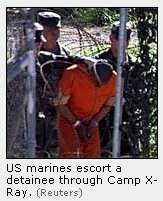 • Close Guantánamo Bay: shut down the detention camp, charge the detainees under US law in US courts or release them.
• Close Guantánamo Bay: shut down the detention camp, charge the detainees under US law in US courts or release them.
Set up on a US naval base on the island of Cuba, Guantánamo Bay was designed as an attempt to put detainees beyond the reach of the rule of law – any law whether US or international. The US Supreme Court ruled that challenges to detention could be brought in the US courts, but not a single case of a Guantánamo detainee has been reviewed by a US court - the US government continues, so far successfully, to block any such reviews. The detention camp at Guantánamo Bay has become the site and symbol of failure to respect human rights in the “war on terror”, and the call for its closure a rallying cry for those demanding respect for human rights and the rule of law.
- Click Here for Complete Story
- Law lords consider 'torture' appeal
- Update on Guantánamo: Hunger strike ends but Amnesty remains concerned about welfare of detainees
- US: Guantanamo Bay Hunger Strike New Call on UK Government to act to save lives
- US: Guantanamo Bay Hunger Strike New Call on UK Government to act to save lives
- USA: Guantánamo hunger strikers critically ill
- Click Here for Guantanamo Bay information page.
Australian 'drug lords' hide in South America
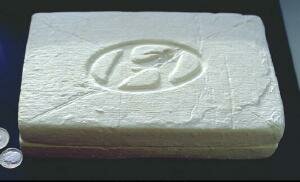 SOUTH America has become the focus of the hunt for one of two Sydney cocaine kingpins believed to have fled the country. Investigators believe Les Mara - one of the principals of a plot to smuggle in 20kg of cocaine through Sydney airport early this year - is hiding in Rio de Janeiro.
SOUTH America has become the focus of the hunt for one of two Sydney cocaine kingpins believed to have fled the country. Investigators believe Les Mara - one of the principals of a plot to smuggle in 20kg of cocaine through Sydney airport early this year - is hiding in Rio de Janeiro.
Mara, 52, and Michael Hurley, 58, are understood to have fled after being tipped off to operation Mocha, a week before the May raids which resulted in 11 arrests.
Both allegedly were kingpins in the conspiracy to smuggle the cocaine from Buenos Aires with the assistance of corrupt baggage handlers at Sydney airport.
- Click Here for Complete Story
A model's fear
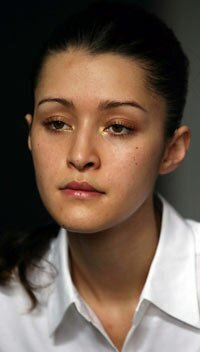 MODEL Michelle Leslie emerged from underneath her now-familiar headscarf as she was led in for questioning by Indonesian prosecutors yesterday.
MODEL Michelle Leslie emerged from underneath her now-familiar headscarf as she was led in for questioning by Indonesian prosecutors yesterday.
The 24-year-old, arrested at a dance party in August for alleged ecstasy possession, was later transferred from a police cell to Bali's notorious Kerobokan jail.
Her prison transfer is a step towards prosecution.
She faces a 10-year sentence if convicted.
Leslie wears a hijab, having converted to Islam a year before her arrest.
This led to claims she was trying to win sympathy from Bali's mostly Muslim judges.
But yesterday Leslie left her face visible until she climbed into the police van, when she pulled the white scarf across her face.

- Click Here for Complete Story
- Model tells of Bali prison torment
Syria: Incommunicado detention/fear of torture: Mustafa Omar Abdi Malik (m)
Appeal Case – Syria - URGENT ACTION
SYRIA Mustafa Omar Abdi Malik (m), aged 19, medical student, Somali national
Student Mustafa Omar Abdi Malik was reportedly arrested at his home in Harasta Taht, a suburb of the capital, Damascus, on 6 September. Around 10 officers from the Syrian Political Security Branch arrested him and confiscated his computer. He has not been heard from since, and he is in grave danger of torture and other ill-treatment.
- Click Here for Complete Story
- Syrian Human Rights Defender receives 2005 Martin Ennals Award

- Further Info on UA 203/05
Bali bombers moved to island 'Alcatraz'
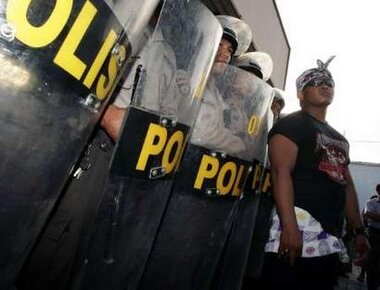 INDONESIA has moved the three ringleaders of the 2002 Bali bombings on death-row because of security concerns at their prison in Denpasar.
INDONESIA has moved the three ringleaders of the 2002 Bali bombings on death-row because of security concerns at their prison in Denpasar.
The men were transferred in three armoured cars and guarded by about 30 heavily armed police.
Their move to a higher security jail came on the eve of the third anniversary of the October 12, 2002 bombings in which 202 people died, including 88 Australians.
So-called smiling assassin Amrozi bin Nurhasyin, Imam Samudra and Mukhlas – all awaiting execution – were moved this afternoon from Bali's Kerobokan Prison to Batu Prison on Nusakambangan, an island off the south Java coast, Bali justice ministry spokesman IG Rata said.
The high-security jail is home to former Indonesian dictator Suharto's son, Tommy, who is serving a 15-year sentence for masterminding the murder of a supreme court judge.
- Click Here for Complete Story
- Bali protesters storm jail where bombers held
A Call To End A Secret, Arbitrary And Cruel Practice – Death Penalty In Japan
A little known fact about Japan is that it carries out the death penalty. Executions in Japan are by hanging and are carried out in secret. Prisoners face the fear of execution every day. They are only informed of their execution a few hours before the sentence is carried out. Prisoners are held in solitary confinement and have very limited access to the outside world, as a result many inmates develop mental disorders. Families of prisoners are informed of their loved ones’ execution only after it has taken place.
AI has received reports that at least eight of the 61 current death row inmates in Japan may be innocent. Forced confessions extracted through torture during pre-trial detention, prosecutorial misconduct and cases of mistaken evidence and identification mean that death-row inmates can be wrongly convicted.

- Click Here for Complete Story
Man extradited to Singapore on murder charges
A British man wanted in relation to the murder of two people in Singapore in 2002 was extradited late yesterday from Australia to Singapore, the Minister for Justice and Customs, Senator Chris Ellison, announced today.
Michael McCrea is wanted by the Singapore Government to face prosecution on two counts of murder and one count of criminal intimidation.
Senator Ellison decided that, under the Extradition Act, Mr McCrea should be surrendered to Singapore. Senator Ellison said that Australia’s extradition legislation does not allow a person to be extradited for an offence which attracts the death penalty unless the requesting country gives an undertaking that the death penalty will not be carried out.
"As Singapore’s law applies the death penalty for the offence of murder, Singapore gave an undertaking to the Australian Government that the death penalty will not be carried out if Mr McCrea is convicted of the offences of murder," Senator Ellison said.
- Click Here for Complete Story
US Immigration Attorney Curtis Sok, saves life of former Lao freedom fighter
 Moua is one of the many Hmong former Special Guerrilla Unit [SGU] members who fought for democracy in the "Laos Secret War" up until the communists seized control of the landlocked country in around 1975.
Moua is one of the many Hmong former Special Guerrilla Unit [SGU] members who fought for democracy in the "Laos Secret War" up until the communists seized control of the landlocked country in around 1975.
Many thousands of ethnic Laotians have been forced, over the years, to flee the persecution from the present day communist regime, including Moua, who recently applied for asylum in the United States of America.
US Immigration Attorney, Mr. Curtis B. Sok from Fresno, California, took up his case after hearing that Moua and his wife were facing deportation.
"He already served two terms in the labour camps in Laos because he was labelled as SGU or American collaborator" said Mr. Curtis. "He is now facing deportation back to Laos and I am trying to save him."
On 7 September 2005, Mr. Curtis Sok wrote to FPSS Advocate Kay Danes, a former political prisoner of Laos released 9 November 2001 and asked if she would support Moua"s application for asylum. Kay Danes submitted her affidavit of the atrocities she herself endured and witnessed in the communist prison [Phonthong].
- Click Here for Complete Story
Sudan: Leading Sudanese human rights group targeted by Government
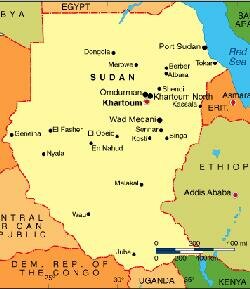 Amnesty International has learnt today that the Sudanese Government has launched legal proceedings against one of the country's leading human rights groups Sudan Organisation Against Torture (SOAT) in apparent attempt to silence the organisation.
Amnesty International has learnt today that the Sudanese Government has launched legal proceedings against one of the country's leading human rights groups Sudan Organisation Against Torture (SOAT) in apparent attempt to silence the organisation.
According to local press reports, Sudan's Bureau of Crimes Against the State began proceedings against SOAT for spreading false information at the end of August but did not inform the organisation. If found guilty, members of the organisation could face more than 5 years in prison.
- Click Here for Complete Story
Jails Fuel China's Secret Economy; Size of Chinese System of Slave Labour Placed at 20 Million Prisoners
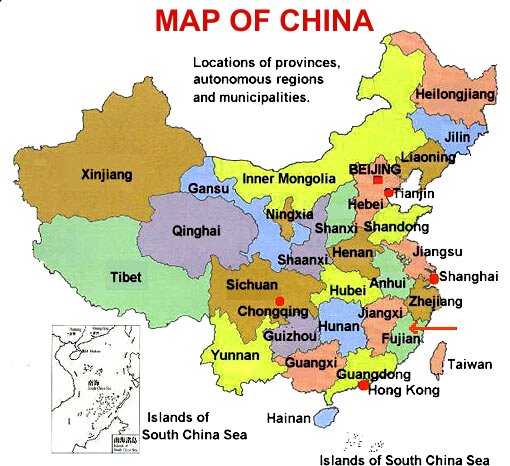 BEIJING, October 5, (Toronto) Globe and Mail [from The Economist] -- With commendable patience China awaits 2004. The talk in Beijing is that its next bid for the Olympic Games must surely be successful. Losing the 2000 Games to Sydney was indeed painful, but for a country that often reminds the rest of the world that Chinese civilization has been continuous for more than 3,000 years, the 10 years to the next Games can easily be endured.
BEIJING, October 5, (Toronto) Globe and Mail [from The Economist] -- With commendable patience China awaits 2004. The talk in Beijing is that its next bid for the Olympic Games must surely be successful. Losing the 2000 Games to Sydney was indeed painful, but for a country that often reminds the rest of the world that Chinese civilization has been continuous for more than 3,000 years, the 10 years to the next Games can easily be endured.
- Click Here for Complete Story
Corby's sister tells of Bali horror
 Australian Mercedes Corby said she had seen Australians with shrapnel wounds, broken bones, horrific burns and eye wounds after the latest Bali bombings.
Australian Mercedes Corby said she had seen Australians with shrapnel wounds, broken bones, horrific burns and eye wounds after the latest Bali bombings.
Mercedes Corby is the sister of Australian Schapelle Corby who is serving 20 years in a Bali jail after being convicted of drug trafficking.
Ms Corby spent all night helping people injured at Kuta, near the Bali capital of Denpasar, after at least one bomb went off. Two simultaneous bombs struck restaurants along Jimbaran beach in Bali.
Australian Foreign Minister Alexander Downer said at least 25 people appeared to have been killed, including possibly three Australians, in the blasts at Kuta and Jimbaran village, but media reports indicate the figure could be higher.
- Click Here for Complete Story
Corby's judges to try Bali Nine case
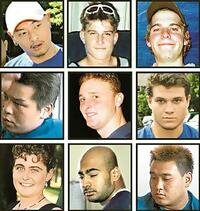 THE alleged ringleaders of the Bali Nine, all of whom face the death penalty on narcotics and conspiracy charges, will be tried by members of the same three-man bench that sent Schapelle Corby to jail for 20 years for drug-running.
THE alleged ringleaders of the Bali Nine, all of whom face the death penalty on narcotics and conspiracy charges, will be tried by members of the same three-man bench that sent Schapelle Corby to jail for 20 years for drug-running.
Andrew Chan, the group's alleged organiser, will appear before a panel that includes one of Bali District Court's most senior judges and a member of the Corby judiciary, I Wayan Suastrawan.
 Mr Chan's alleged lieutenant, Myuran Sukumaran, will be tried by a bench headed by senior judge Gusti Lanang Dauh, who also sat in judgment of the Gold Coast beautician.
Mr Chan's alleged lieutenant, Myuran Sukumaran, will be tried by a bench headed by senior judge Gusti Lanang Dauh, who also sat in judgment of the Gold Coast beautician.
- Click Here for Complete Story
- Death penalty concern for Bali 9
- Prosecutors seek death for Bali Nine
- Prosecutors split over Bali Nine's fate
Local man prepares for drug trial
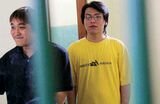 Bali Nine man Tach Duc Thanh Nguyen, of Wellington Point, is expected to face trial for alleged heroin trafficking within a fortnight. The 22-year-old was detained in Indonesia more than five months ago with eight other young adults for allegedly attempting to export the narcotic into Australia.
Bali Nine man Tach Duc Thanh Nguyen, of Wellington Point, is expected to face trial for alleged heroin trafficking within a fortnight. The 22-year-old was detained in Indonesia more than five months ago with eight other young adults for allegedly attempting to export the narcotic into Australia.
The arrests were the result of a trans-national crime investigation conducted by the Australian Federal Police and the Indonesian National Police.
However, contrary to media reports that all nine have been charged and face the death penalty, a government source said until charges were confirmed at the first hearing "it is not certain which, if any, of the accused will face the death penalty".
Talk of the death penalty disturbed some acquaintances of Tach's family.
One woman, speaking on condition of anonymity, said Tach was a "very quiet ... good boy" who enjoyed tinkering with his modified car.
Another source said while she couldn't "understand people taking that risk ... you have to feel for the families and everyone else involved". She criticised the AFP for failing to arrest the syndicate in this country, making it easier for their families to provide support.
 Her comments were echoed by vocal human rights advocate Kay Danes, of Wellington Point, who recently spoke to and offered assistance to Tach's parents.
Her comments were echoed by vocal human rights advocate Kay Danes, of Wellington Point, who recently spoke to and offered assistance to Tach's parents.
- Click Here for Complete Story
- Prosecutors seek death for Bali Nine
Adelaide drug accused faces 20 years
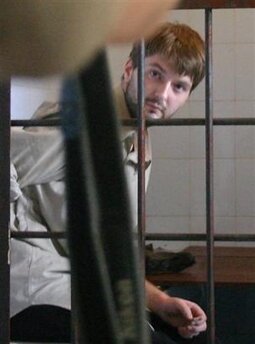 An Adelaide man accused of drug possession in Indonesia is facing 20 years in jail, police say.
An Adelaide man accused of drug possession in Indonesia is facing 20 years in jail, police say.
Former schoolteacher Graham Clifford Payne, 20, was arrested in the north Sumatra city of Medan in August.
Police allegedly found a pouch full of methamphetamines, known locally as shabu shabu, in his pocket.
A subsequent search of his home allegedly uncovered a heroin-filled syringe and more than 2,000 tablets containing 11 different kinds of prescription drugs.
Detectives had originally planned to recommend only a 10-year jail term.
But the head of the drug squad in Medan, Captain Irwan Anwar, said evidence files to be handed to prosecutors on Wednesday recommended joint psychotropic and narcotics charges carrying a total of 20 years in prison.
"It will be accumulated," he told AAP. "It's a maximum penalty of 20 years."
- Click Here for Complete Story
Hicks dodging justice: Downer
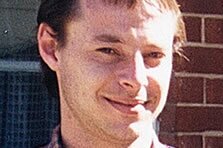 Australian terror suspect David Hicks will be dodging justice if he gets out of Guantanamo Bay via British citizenship, Foreign Minister Alexander Downer says.
Australian terror suspect David Hicks will be dodging justice if he gets out of Guantanamo Bay via British citizenship, Foreign Minister Alexander Downer says.
Hicks, 30, has been in detention for nearly four years but hopes that British citizenship - through his British mother, could clear a path to freedom.
 During a recent chat about the Ashes cricket series with his US military-appointed lawyer Major Michael Mori, Hicks revealed his mother was British and had never taken out Australian citizenship.
During a recent chat about the Ashes cricket series with his US military-appointed lawyer Major Michael Mori, Hicks revealed his mother was British and had never taken out Australian citizenship.
Maj Mori then took an application for citizenship for Hicks to the British embassy in Washington.
- Click Here for Complete Story
Another Aussie faces jail over drugs
A QUEENSLAND man is the latest Australian to be jailed in Indonesia on drug charges after he was arrested in possession of methamphetamines.
Police in Sangatta, East Kalimantan, yesterday confirmed John Michael Kelly, 45, was arrested with of 0.5g of "shabu-shabu" (methamphetamine) which he allegedly bought for about $140.
Mr Kelly faces drug laws that carry a maximum five-year jail term for owning, keeping or smuggling drugs.
Captain Anjas Gautama Putra said Mr Kelly and an Indonesian prostitute, 24, were caught allegedly in possession of about 0.5g of the drug, along with paraphernalia such as a waterpipe (bong), a cigarette lighter and a candle.
Mr Kelly, from Warwick, was arrested late on Saturday night at a hotel in Sangatta where police allege he and the woman were using the drug.
- Click Here for Complete Story
- Brisbane man faces Indonesian drug charges
Prison Fellowship Nepal opens thirteenth Prison Library
The FPSS has today received a report from the Prison Fellowship in Nepal regarding their good work in opening a library project in Chautara Jail, and area mostly effected by Maoists.
This is the thirteenth Prison Library which has now been established. Their report continues below ...
We have to be competed two prison libraries according to our previous plan. This project we have decided with the recommendation of Prison Management Department of His Majesty Government of Nepal in the year 2004. We have selected fifteen prison to establish library on the based of need , number of prison population and remote areas.
- Click Here for Complete Story
Deported to where?! Incommunicado detention and torture of forcibly returned Syrians
This Appeal Case raises Amnesty International's continuing concerns about a number of Syrian nationals being detained without charge or trial after being deported to Syria. Of the five men described here, detained for between four and 22 months, three have been denied access to visits from their families or a lawyer, and at least three of them have reportedly been tortured. Amnesty International does not know where two of them are being held and has grave fears for the safety of all five men.
- Click Here for Complete Story
Asylum-seekers in Australia remain in long-term limbo
Ahmed was not quite 11 years old when his family arrived in Australia seeking asylum. Placed in immigration detention, his mental health deteriorated alarmingly. Ahmed tried to hang himself twice in seven months and committed many acts of self-harm. After three long years Ahmed and his family were finally recognized as refugees and released.
This is just one of the stories contained in AI's June 2005 report, The impact of indefinite detention: The case to change Australia's mandatory detention regime (ASA 12/001/2005). There are hundreds more stories which could be told of lives blighted, sometimes irredeemably, by Australia's mandatory detention regime.

- Click Here for Complete Story
- Yemenis held in secret US detention centres
- 'Disappeared' for 10 years
Inside Guantánamo Bay
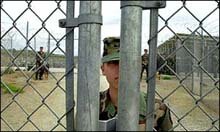 Human rights lawyer Clive Stafford-Smith talks to AI about his experiences inside the notorious US detention centre at Guantánamo Bay, Cuba
Human rights lawyer Clive Stafford-Smith talks to AI about his experiences inside the notorious US detention centre at Guantánamo Bay, Cuba
I went to Guantánamo for the first time in November [2004] and I’ve been back four times now. You’re never quite sure whether to laugh or cry when you’re there. The soldiers go around saluting each other saying, "Honour bound, sir," and the other says, "To defend freedom".
I think if you’d been asking two years ago, would we be closing Guantánamo, it wouldn’t have been on the radar screen. Now Guantánamo is in its death throes, but of course, it’s always been a distraction from the real issues. And the real issues are if you’ve got 520 people in Guantánamo, there are probably another 12,000 folk who are being held in US detention centres around the world and being abused there. The bigger problem is, what’s the substitute? Unfortunately, I think, the US has plans to take a lot of prisoners away from Guantánamo to Bagram airforce base and beyond. We have to start thinking beyond Guantánamo Bay to all the other detention centres and American proxy prisons around the world.

- Click Here for Complete Story
Thailand repatriates 19 Nigerian inmates
BANGKOK - Nineteen Nigerian prisoners on Friday left Thailand for home to serve their remaining imprisonment terms, a local newspaper reported Saturday.
The 19 was the last batch of 56 Nigerian inmates to be repatriated this year under an agreement between Thailand and Nigeria that took effect in November 2002.
All 19 were convicted on drug-related offenses. Ten of them are serving life sentences and they were repatriated after serving eight years of their sentences in Thailand already, while the other nine are qualified for repatriation after serving at least four years here.
The repatriation program went smooth thanks to the "good cooperation" from the Nigerian government and more Nigerian inmates would go home in the future, newspaper Nation on Saturday quoted Corrections Department Director-General Natthee Jitsawang as saying.
So far, there are still 98 Nigerians serving terms in Thai prisons, most of whom were jailed for drug-related convictions. Many of them are qualified for repatriation but they have to wait until they or their families can afford their travel expenses.
- Click Here for Archive of Story
Aussie held in Italy over drugs
AN Australian man who allegedly posed as a policeman to smuggle 10kg of pure cocaine through Italy faces up to 20 years in jail.
The man, 30, variously described as a Queenslander and Sydneysider, was named by Italian authorities yesterday as Fuc Iang Lay. Mr Lay is in jail awaiting trial after being arrested by Italian police at Rome airport on August 15 and charged with drug trafficking.
"Reports of him being a policeman are incorrect," an Australian embassy official in Rome said yesterday.
"He may well have been pretending to be a policeman.
"He has an Australian passport. Consular officers are providing assistance to the man and his family in Australia."
- Click Here for Complete Story
- Aussie held in $8m cocaine bust
Fear of torture/ incommunicado detention/ prisoners of conscience New concern: Legal concern
Yassin al-Hamwi (m), aged about 60, shopkeeper, founding member of the Committee of the Families of Prisoners of Opinion and Conscience Muhammad 'Ali al-'Abdullah (m), law student, founding member of the Committee of the Families of Prisoners of Opinion and Conscience
On 16 August, prisoners of conscience Yassin al-Hamwi and Muhammad 'Ali al-'Abdullah were released on bail, pending their trial before a military court in Damascus on 6 September. The two men are said to be in good health and have thanked Amnesty International for its continuing efforts on their case.
- Click Here for Complete Story
Kay locks down to help refugees
 LAO refugees call her "Nang", Sister Kay, a term of reverence for someone toiling to "open the ear of the world" to their suffering.
LAO refugees call her "Nang", Sister Kay, a term of reverence for someone toiling to "open the ear of the world" to their suffering.
Wellington Point woman Kay Danes is doing her utmost to "make a difference" not only for those fleeing the communist regime, but, closer to home, by supporting the families of some of the Bali Nine and Schapelle Corby.
As a family advocate for the Foreign Prisoner Support Service Kay has also, unsuccessfully, attempted to contact the family of Wellington Point man Tach Duc Thanh Nguyen, one of nine Australians arrested in Bali for allegedly trafficking heroin.
The invaluable support she and husband Kerry received from fellow Aussies and the Australian Government when snatched and wrongfully detained in Laos convinced Kay of her need to work as a humanitarian.
While nearly four years has passed since the Daneses were released thanks to Federal Government intervention, brutal prison treatment is forever etched on Kay's mind.

- Click Here for Complete Story
Aussie reprieved from Vietnam death sentence
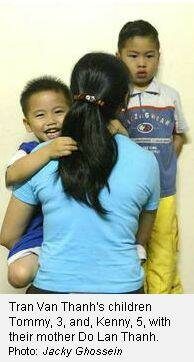 The wife of an Australian heroin trafficker who has had his death penalty in Vietnam commuted to life in prison says she is relieved but sad that he may never see their children again.
The wife of an Australian heroin trafficker who has had his death penalty in Vietnam commuted to life in prison says she is relieved but sad that he may never see their children again.
The Vietnamese President yesterday commuted Tran Van Thanh's death sentence for trafficking heroin from Vietnam to Australia as part of a seven-member gang commuted to life imprisonment.
His wife, Do Lan Tran, who lives in Cabramatta with the couple's two young sons, said her sister-in-law had visited him in prison in Ho Chi Minh City on August 5.
- Click Here for Complete Story
- Aussie reprieved from Vietnam death sentence
- Australian's sentence commuted
Randy Sachs is a fallen angel.
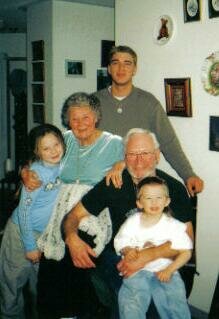 Heralded as a hero, he's since landed hard -- and far -- from the Canadian idol he once was.
Heralded as a hero, he's since landed hard -- and far -- from the Canadian idol he once was.
In 2001, he saved a stranger from a burning car. Today, he struggles to salvage his own life in a Vietnamese prison -- apparently peeing blood and counting teeth as they rot off the jaw. From behind walls of a prison in southern Vietnam, the Hamilton man is offering a rare glimpse of harsh and allegedly inhumane foreign jails that he now calls home.
As he does this, Randy Sachs is also providing proof of the complexities of the human heart. The duality of one man.
On Christmas Eve, just four years ago, the then 24-year-old bar manager was driving to his mom's Beaverton home. On the way, he noticed a car crashed into a ditch.
The vehicle, with 22-year-old student Shawn Rozko unconscious at the wheel, had rammed a stop sign, flown off the road and landed in icy waters of the shallow ravine. With the doors locked and Rozko blacked out, Sachs ran back to his family car, grabbed a hammer and shattered the window. Before the Chevy burst into flames, he dragged the bigger man out, put him over his shoulder and ran to safety. Rozko woke, suffering from smoke inhalation, in an ambulance.
Arrested 5 months later
"All I can do is hug him and thank him for saving my life and tell him he's my guardian angel," Rozko told the Sunday Sun in a 2002 article, entitled "Angels Among Us."
No trial date was set.

- Click Here for Complete Story
- Randy Sachs Case Information
Aussies face trial on HK heroin charges
Three young Australians have been ordered to stand trial on heroin smuggling charges in Hong Kong.
Hutchinson Tran 21, unemployed, Rachel Ann Diaz, 17, a hair stylist, and Chris Ha Vo, 15, a fast food worker - all from Sydney - entered not guilty pleas in the Eastern Magistrates Court.
Their committal hearing ended within five minutes when a magistrate ruled that they had a case to answer.
The trio are being held in custody and did not apply for bail.
No trial date was set.
- Click Here for Complete Story
The unfairness of the Thailand – England Prisoner Transfer Treaty
I, Steve Willcox, British Citizen was arrested in Thailand on April 21st 2003 for 25 grams of category 1 drug found in the house I was living. You may consider this to be a small quantity of drugs for personal use but in Thailand even a small quantity of drugs for personal use may well be considered as distribution by Thailand’s Law and have severe consequences. Being arrested and sentenced to serve a term of imprisonment in Thailand is a terrifying experience, human rights violations in Thailand’s judicial system as well as cruel and inhuman degrading treatment, horrifying conditions in prisons. Thailand hands out some of the most severe penalties for drug offences in the world. i.e. death penalty, life sentence, 50 year sentence and in my case 33 years 6 month and a fine of £ 11.000. A comparable sentence for my crime in England would probably require me to serve a term of imprisonment of less than 1 year.

- Click Here for Complete Story
- Stephen Wilcox Case Page
Unjust trial of opposition parliamentarian leads to conviction, 7 years
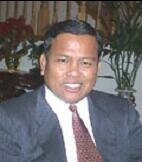 On Tuesday morning August 9, Military Court Judge General Nay Thol sentenced opposition Law maker Cheam Channy to 7 years imprisonment on charges of organizing illegal armed forces and committing fraud, despite lack of credible testimony or evidence to back up charges.
On Tuesday morning August 9, Military Court Judge General Nay Thol sentenced opposition Law maker Cheam Channy to 7 years imprisonment on charges of organizing illegal armed forces and committing fraud, despite lack of credible testimony or evidence to back up charges.
The Cambodian League for the Promotion and Defense of Human Rights (known by its French acronym LICADHO), condemned the August 8 trial of Cheam Channy, a parliamentarian for the Sam Rainsy Party, which should not have been held in the Military Court. The Military Court does not have jurisdiction over civilians such as Cheam Channy. LICADHO is also deeply concerned by the grossly unfair treatment of Cheam Channy during the course of the trial.
Judge Ney Thol, who is the President of the Military Court, seriously obstructed the ability of Cheam Channy's defense lawyers to defend their client. The Judge limited the defense lawyers' questioning of Cheam Channy during the trial, and did not permit the lawyers to call their own witnesses to testify. In addition, the judge did not allow the defense lawyers to cross-examine all of the prosecution witnesses. Defense lawyers were initially permitted to cross-examine the first prosecution witness. After this witness made statements during the cross-examination that raised doubts about his credibility, the judge stopped the defense lawyers from questioning him further and did not permit the defense to question any other prosecution witnesses.
- Click Here for Complete Story
Laos makes strides in emerging from isolation
HANOI, July 22 (AFP) - Emerging from a long period of isolation, Laos is getting ready to host its second major international meeting within a space of eight months and carving out a spot on the global diplomatic circuit.
The land-locked country of 5.3 million people, which has been under rigid communist rule since 1975, last November had the luxury of hosting 15 heads of government, including those of regional giants, China, Japan and India.
Next week, the poorest of Southeast Asian states will again roll out the red carpet, this time for more than 20 foreign ministers.
In addition to the countries represented in the November summit, the meeting will be attended by leading diplomats from the European Union, Russia and the United States to talk about security.
- Click Here for Complete Story
Children freed from Aust Detention centres, at last
Children were whisked out of Baxter detention centre yesterday and taken to a Port Augusta housing complex to await their release today.
Ten families, with 18 children, will be released today under a softening of the Federal Government's immigration detention policy.
Prime Minister John Howard's six-week deadline to have all children out of detention centres expires today.
- Click Here for Complete Story
- 42 children released from immigration detention
Hmong refugees pleading to stay
In a temporary camp in Phetchabun, northern Thailand, there is a constant chorus of babies crying and children coughing. Smoke rises from damp wood stacked under iron pots. It always seems to have rained, or to be on the point of doing so.
The camp is home to a growing number of Hmong refugees, who started arriving in the northern Thai province last year.
In recent months the numbers have grown to more than 5,000.
- Click Here for Complete Story
Appeal to help arrested members of the Committee of the Families of Prisoners of Opinion and Conscience
Prisoners of conscience Yassin al-Hamwi and Muhammad 'Ali al- 'Abdullah are now known to have been held first at the Political Security Detention Centre in Damascus, and moved from there to 'Adra prison, near Damascus. They are known have been allowed at least one visit each from family members, but it is not known whether they have been tortured.
They are reportedly to be tried by a military court on charges of "establishing a secret society" and "defamation of the public administration". Trials before military courts are not independent or impartial. In many cases defendants appear to be presumed guilty, and their rights to present a defence and have legal representation are not respected.
- Click Here for Complete Story
Korean criminal pardon fails to tackle problems
 In South Korea, committing adultery or breaking a promise to marry someone can land the transgressor in the dock. By the same token, there is a good chance that anyone who breaches foreign currency controls or becomes involved in a contractual dispute will end up with a criminal conviction.
In South Korea, committing adultery or breaking a promise to marry someone can land the transgressor in the dock. By the same token, there is a good chance that anyone who breaches foreign currency controls or becomes involved in a contractual dispute will end up with a criminal conviction.
South Korea may have a developed economy, an elected government and sophisticated television phones, but its justice system remains stuck in the past.
On Monday, the day Koreans celebrate the 60th anniversary of liberation from Japan, President Roh Moo-hyun will pardon 4.2m criminals. Reprieves will be granted for everything from traffic violations and breaching the national security law which until this year labelled North Korea as the South's main enemy to business and political crimes.
While pardons are routinely granted on Chuseok (Korean thanksgiving), lunar new year and Buddha's birthday, this is the fourth-largest amnesty in the 57-year history of the Korean constitution.
The staggering scale of the amnesties reflects the criminalisation of South Korean society. The judicial system is at the heart of the problem there is no civil code to speak of in South Korea, so every transgression becomes a crime, and lawyers complain about the politicisation of the judiciary and almost universal powers of prosecutors.
- Click Here for Complete Story
- North Korea sets amnesty as outside pressures grow
HICKS: Not a Happy Birthday!
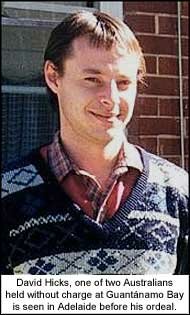 David Hicks, the Australian imprisoned at the US Base of Guantanamo Bay, will be 30 years old this coming Monday August 7, 2005.
David Hicks, the Australian imprisoned at the US Base of Guantanamo Bay, will be 30 years old this coming Monday August 7, 2005.
Justice for Hicks and Habib campaigner, Marlene Obeid, said: ‘David has been imprisoned and tortured for 3 years and 9 months now. Another birthday in the hellhole of Guantanamo – nothing to be happy about.’
Mr Hicks’ Australian solicitor, David McLeod, found in a recent visit to the US Base that his client is losing his eyesight, has severe back problems, and his mental condition is rapidly deteriorating.
- Click Here for Complete Story
- David Hicks Case Information

- Hicks turns 30 as he still awaits trial
- Top lawyer takes aim at Hicks commission
- Hicks Case Flawed: Prosecutors
- Two US Prosecutors Claim Guantanamo Trials Rigged
- Law Council condemns Hicks trialClick Here for Complete Story
- US rules out death penalty for Hicks
- Tribunals to Resume for Guantanamo Detainees
Homage to a Human Rights Defender
The Lao Movement for Humans Right (LMHR) learned with deep emotion and infinite sadness the passing away of Dr. Pozeb VANG, a true human rights militant.
Founder of the Lao Human Rights Council, for which he has ensured the presidency with devotion and efficiency since 1987, Dr. Pozeb VANG dedicated his life to the values of freedom, justice and basic rights of the Lao people, particularly Lao-Hmong persecuted in the Lao People's Democratic Republic ( LPDR).
- Click Here for Complete Story
Govt backs crackdown on tourists in Bali
 Australia has backed a crackdown on tourists who flout Indonesia's drug laws after Bali police said they would force travellers to undergo random urine tests at clubs and rave parties.
Australia has backed a crackdown on tourists who flout Indonesia's drug laws after Bali police said they would force travellers to undergo random urine tests at clubs and rave parties.
Bali drug squad chief Bambang Sugiarto plans to get Indonesian drug squad officers to force tourists, at random, to submit to the urine tests at social venues.
He says education campaigns have been run about Indonesia's drug laws. The next logical steps for officers trying to uphold those laws are random testing and raids, he says.
Foreign Minister Alexander Downer has backed the crackdown, which follows the recent series of Australian arrests including Sydney model Michelle Leslie.
- Click Here for Complete Story
I'm innocent, says teen jailed in Cambodia
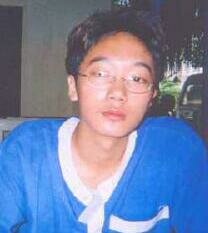 SENTENCED to serve 13 years in a squalid Cambodian jail for drug trafficking, Sydney teenager Gordon Vuong sleeps on concrete, misses his mother and wants John Howard to help bring him home.
SENTENCED to serve 13 years in a squalid Cambodian jail for drug trafficking, Sydney teenager Gordon Vuong sleeps on concrete, misses his mother and wants John Howard to help bring him home.
In an exclusive interview with The Australian, the Campsie high school student maintained his innocence, saying he was forced to act as a drug mule after threats were made against his mother in Sydney and aunt in Hong Kong.
Vuong, who turned 17 on August 2, is the youngest Australian in an overseas jail for drug offences.

- Click Here for Complete Story
- Australian jailed for 18 years over opium: report.
- Australian Federal Government has to get involved.
- Gordon Vuong Case Page
Activist now back in US told to pay $11,000
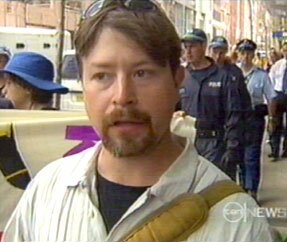 AMERICAN peace activist Scott Parkin arrived back in the US today after spending five days in a Melbourne jail as a "national security risk".
AMERICAN peace activist Scott Parkin arrived back in the US today after spending five days in a Melbourne jail as a "national security risk".
The 36-year-old Texan history teacher was also given a bill for almost $11,700 after his brush with Australian authorities. Mr Parkin said he was made to feel like a terrorist and a criminal and remained baffled as to why six police officers "snatched him off the street" as he left a Melbourne cafe last Saturday.
He said he was interrogated and spent the next five days in solitary confinement.
He was escorted by two Victorian correctional officers on a Qantas passenger plane which left Melbourne yesterday, arriving in Los Angeles this morning.
"I'm just completely baffled by all of this," said Mr Parkin, surrounded by Australian TV cameras and media, soon after his arrival at Los Angeles international airport.
- Click Here for Complete Story
- Peacenik detention 'not political'
Leslie drug brief in hands of lawyers
 On the front page of the 1.5cm thick dossier is a head and shoulders mug shot of Leslie taken recently by police, since she began wearing a black Muslim burqa-style headcovering.
On the front page of the 1.5cm thick dossier is a head and shoulders mug shot of Leslie taken recently by police, since she began wearing a black Muslim burqa-style headcovering.
Authorities have not backed off when it comes to the seriousness of the charges. They have recommended to prosecutors that the 24-year-old face two charges – a primary charge and a lesser subsidiary charge.
The primary charge, under article 59 of Indonesia's drug laws, carries a maximum 15-year jail term for those who, without right, possess, keep and/or bring drugs.
The subsidiary charge, under article 60, carries a maximum three years' jail for those who receive or hand over drugs, and for those who are users of the drug the maximum is only three months' jail.
The top model has been held in Denpasar's Polda police headquarters jail since her arrest on August 20 this year as there is no provision under Indonesian law for bail. Her team hopes to have her moved as early as next week to Bali's Kerobokan jail which also houses Australians Schapelle Corby and the Bali Nine heroin gang suspects.
- Click Here for Complete Story
- Fear and frustration, model's daily fare in Bali
- Police check bribery report
- Bali model now a devout Muslim
- Aussie model in Bali drug bust
Prosecutors confident on Corby life term
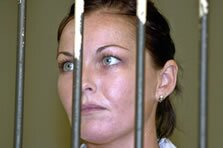 Indonesian prosecutors are confident that a Bali appeals court will increase Schapelle Corby's 20-year jail term to life imprisonment.
Indonesian prosecutors are confident that a Bali appeals court will increase Schapelle Corby's 20-year jail term to life imprisonment.
In contrast, the Gold Coast woman is praying that the judges will overturn her conviction for drug smuggling and free her.
The defence and the prosecution have filed competing appeals and both expect the Bali High Court to bring down its decision soon.
If she is not released, her defence team expects the court will cut her sentence.
However, prosecutor Ida Bagus Wiswantanu said he would not be satisfied until Corby was serving a life term for importing 4.1kg of marijuana into Bali last year.
"We are confident the High Court will increase the sentence because drug crimes have wide implications on society," he said. "If it does not, we will appeal to the Supreme Court."
 Corby is waiting for the court's ruling in a cell at Bali's Kerobokan Prison.
Corby is waiting for the court's ruling in a cell at Bali's Kerobokan Prison.
- Click Here for Complete Story
- Corby may wait another month: lawyer
- Message from Schapelle Corby
News Release October 6, 2005 - LPDR Retribution
Laos (FFC) On Saturday June 4, 2004 the Fact Finding Commission monitored the surrender of 173 members (mostly women, children, and the elderly) of a Secret War veterans group to the Lao government at the village of Chong Thuang, Laos. After what appeared in the beginning to be a good faith effort on behalf of the LPDR (applauded by Kofi Annan) the Lao military took charge of the group. Though the Lao government has reported that the people we cared for, to date they have not allowed international verification of the treatment given this group. The Fact Finding Commission received the following disturbing report.
- Click Here for Complete Story
Cambodia groups hold land forum
 The indigenous peoples of Cambodia have been holding a forum to discuss the threat to traditional territory posed by incomers and land speculators.
The indigenous peoples of Cambodia have been holding a forum to discuss the threat to traditional territory posed by incomers and land speculators.
The forum was an effort to find a common strategy to reverse the trend.
Representatives from 15 provinces made the arduous journey to Stung Treng, in the remote north-east of the country.
The indigenous peoples now plan to enlist the UN's help, and hope this will persuade the government to pass laws to recognise minority rights.
Cambodia's indigenous peoples are all facing similar problems and the forum was a valuable opportunity to share experiences and formulate strategies.
Land grabs, the destruction of the natural environment and the erosion of traditional culture were all on the agenda.
- Click Here for Complete Story
At least 31 killed in Guatemala prison gang war
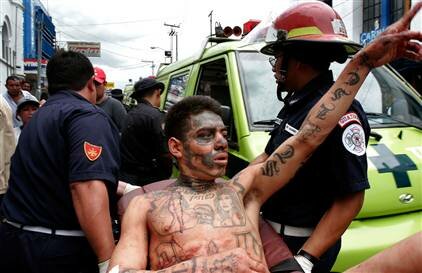 ESCUINTLA, Guatemala - Gang members staged simultaneous riots in at least seven Guatemalan prisons on Monday, attacking rivals with grenades, guns and knives in coordinated chaos that left 31 inmates dead, officials said.
ESCUINTLA, Guatemala - Gang members staged simultaneous riots in at least seven Guatemalan prisons on Monday, attacking rivals with grenades, guns and knives in coordinated chaos that left 31 inmates dead, officials said.
The riots apparently began with attacks by members of the Mara Salvatrucha gang against rivals of the MS-18 gang, said Interior Minister Carlos Vielmann.
He said 31 inmates died before the riots were brought under control shortly after noon.
An Associated Press photographer saw 18 bodies, many riddled with bullet wounds, carried from El Hoyon prison, which was specifically built to hold gang members in Escuintla, 30 miles south of the capital. A guard and 61 inmates were injured at El Hoyon, and tattooed gang members bleeding from knife wounds were carried from the prison on stretchers.
- Click Here for Complete Story
Aussies captured overseas generates media club interest.
 In an Australian first, human rights campaigner Kay Danes and Terry Hicks, father of Guantanamo Bay detainee, David Hicks, will present the inside story of their personal dealings with overseas justice systems at Conrad Jupiters on Friday 26th August.
In an Australian first, human rights campaigner Kay Danes and Terry Hicks, father of Guantanamo Bay detainee, David Hicks, will present the inside story of their personal dealings with overseas justice systems at Conrad Jupiters on Friday 26th August.
And, with Guantanamo Bay back in the news this week, it’s set to be a hugely interesting afternoon.
- Click Here for More Information & Booking Info
865 SA smugglers behind bars
Cape Town - There are 865 South Africans in prisons across the world for trying to smuggle drugs from South Africa into foreign countries.
According to police, syndicates canvass these so-called drug mules to smuggle drugs out of the country.
The mules receive between R20 000 and R50 000 for their trouble, depending on the type and amount of drugs they smuggle.
Superintendent Ronnie Naidoo said the swallowing of condoms filled with drugs was still the preferred method of smuggling drugs.
Seventy of the 107 drug mules arrested last year had swallowed the consignments.
The new hearing was scheduled for August 3.
- Click Here for Complete Story
Vietnam jails Australian woman for drugs
A court in Vietnam's Ho Chi Minh City has sentenced an Australian woman to 20 years in prison for heroin trafficking.
Tran Thi Hong Loan, a 33-year-old Australian of Vietnamese origin who lives in NSW, was convicted of trafficking 580 grams of heroin and given a 20-year sentence at a one-day trial on Friday, a court official said.
Vietnamese authorities found the heroin hidden on her body and in her luggage as she was about to board a flight to Sydney last August, said the official, who identified himself only as Hieu.
She has 15 days to appeal her sentence.
In Vietnam, possessing, trading or trafficking 600 grams of heroin or 20 kilograms of opium is punishable by death or life in prison.
About 100 people are sentenced to death each year in Vietnam for drug-related offences.
- Click Here for Complete Story
Man faces jail after Bali drug bust
A MELBOURNE-based German citizen is the latest foreigner to be charged with drug offences in Bali.
Patrick Guy Prinzler, 34, whose last known address was Queens Rd, is in a Denpasar jail accused of having 0.7g of hashish in his pocket.
Mr Prinzler, who was holidaying in Bali, faces a maximum 10-year jail term for possession of illegal drugs.
Police said Mr Prinzler was arrested late last week in the upmarket area of Seminyak after a tip-off.
- Click Here for Complete Story
Peter Qasim Freed! - 'Happy' Qasim thanks supporters
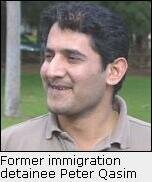 Australia's longest serving immigration detainee, Peter Qasim, says he is very happy to be released after seven years in detention.
Australia's longest serving immigration detainee, Peter Qasim, says he is very happy to be released after seven years in detention.
The Federal Government announced several weeks ago that Mr Qasim would be released pending health and character checks.
He received a bridging visa after it was approved by the Immigration Minister Amanda Vanstone last night.
Mr Qasim is currently receiving treatment at Adelaide's Glenside Psychiatric Hospital, and will consult with his doctors tomorrow to work out a plan for his release from the hospital.
Mr Qasim says he plans to live with an Adelaide couple, and would like to seek work when his health improves.
He has thanked those who played a role in his release.
- Click Here for Complete Story
- Qasim thanks govt for freedom at last
- After 7 years, Qasim can go free
- Click Here for Peter Qasim Case Information
Man faces jail after Bali drug bust
A MELBOURNE-based German citizen is the latest foreigner to be charged with drug offences in Bali.
Patrick Guy Prinzler, 34, whose last known address was Queens Rd, is in a Denpasar jail accused of having 0.7g of hashish in his pocket.
Mr Prinzler, who was holidaying in Bali, faces a maximum 10-year jail term for possession of illegal drugs.
Police said Mr Prinzler was arrested late last week in the upmarket area of Seminyak after a tip-off.
- Click Here for Complete Story
Prisoners complain to European Court and President
UKRAINE, Kiev. More than 9,000 complaints filed by Ukrainian prisoners are pending at the European Court of Human Rights. The number of the complaints has increased fivefold since the early 2000s.
Prisoners complain of the dragged-out judicial process, torture during interrogations and poor conditions in pre-trial detention and prisons. Almost 20,000 people are currently held in pre-trial detention without charge. Because of severe overcrowding prisoners are often unable to find space to write a letter of appeal.
- Click Here for Complete Story
Prison Director Sacked After Hundreds Of Cases Of Self-Mutilation
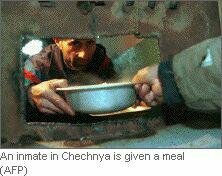 Hundreds of inmates have slashed their bodies with razor blades to protest mistreatment and beatings by guards at a prison camp in the city of Lgov, 500 kilometers south of Moscow. The prison director and his two deputies were sacked on 4 July after an investigation backed the inmates' claims of abuse. The unprecedented mass mutilation has outraged human rights groups and drawn attention to the nightmarish conditions that plague many Russian prisons.
Hundreds of inmates have slashed their bodies with razor blades to protest mistreatment and beatings by guards at a prison camp in the city of Lgov, 500 kilometers south of Moscow. The prison director and his two deputies were sacked on 4 July after an investigation backed the inmates' claims of abuse. The unprecedented mass mutilation has outraged human rights groups and drawn attention to the nightmarish conditions that plague many Russian prisons.
- Click Here for Complete Story
Teen jailing prompts treaty talks
 THE desperate plight of a Sydney teenager sentenced to 13 years' jail for heroin smuggling has prompted the Howard Government to begin negotiations for a prisoner exchange treaty with Cambodia.
THE desperate plight of a Sydney teenager sentenced to 13 years' jail for heroin smuggling has prompted the Howard Government to begin negotiations for a prisoner exchange treaty with Cambodia.
Justice Minister Chris Ellison said the Government was keen to help 16-year-old Gordon Vuong, who has spent the past five months in a squalid Cambodian prison.
"It is of concern that we have a juvenile Australian national who has been sentenced to 13 years in Cambodia," Senator Ellison said yesterday.
"We are certainly addressing the question of the transfer of prisoners with Cambodia, as well as other areas of co-operation. "Leaving aside the question of guilt and the offence involved, where you have a juvenile there are different considerations."
- Click Here for Complete Story
Hmong Refugees in Thailand Evicted
Soaked by rain, thousands of poor ethnic Hmong refugees from Laos were living without shelter in northern Thailand on Tuesday, forced from their homes under a Thai campaign to pressure them to return to their native land.
Landlords in this village said the government set a Monday deadline for them to evict the some 6,500 refugees from their bamboo shelters, threatening them with prison or fines up to $1,200 for sheltering the Hmong, considered by Thailand to be illegal immigrants.
Thai officials also instructed vendors not to sell food to the refugees, including children, camped out since late Monday by the roadside in Huay Nam Khao, village leaders said.
"They have no place to stay, no place to cook, how can they stand the heat and rain?" asked Sawai Leeprecha, a Thai-Hmong village leader.
- Click Here for Complete Story
- Hmong `will be forced back' - Laos taking steps to prevent their return
When foreign children run a foul of the law
My kids generally don't mind it when I write about them in this column, although on occasion my older son has accused me of exploiting him for professional gain. It happened again when he heard the topic for today's column. "You're writing about foreign kids who get in trouble with the police?" He rolled his eyes. "And I suppose you want me to get myself arrested so you can write all about it!"
Actually, that's one experience I could live without. I hope neither of my kids ever get arrested, particularly in a foreign country. But such things happen. Last year, more than 1,000 foreign juveniles were arrested in Japan. More than half were either Brazilian or Chinese, but kids of many different nationalities were detained. Some get convicted.
Of the 5,809 minors admitted to the Japanese juvenile correction system in 2002, 153 were foreigners. There are currently three U.S. citizens under the age of 20 in Japanese reformatories.
- Click Here for Complete Story
Dayton Asks Rice to Send Delegation to Laos
 Sen. Mark Dayton and Wisconsin's two senators want Secretary of State Condoleezza Rice to send an independent intermediary to Laos to monitor the country's treatment of Hmong refugees.
Sen. Mark Dayton and Wisconsin's two senators want Secretary of State Condoleezza Rice to send an independent intermediary to Laos to monitor the country's treatment of Hmong refugees.
The Hmong, an ethnic group that fought alongside the CIA during the Vietnam War, have been living on the run in the Laotian jungles since the end of the war and have faced persecution by the communist government. Thousands of Hmong who were able to flee the country settled in Minnesota and Wisconsin.
Earlier this month, 170 women, children and old men emerged from jungle hideouts in Laos and surrendered to the government, the first wave of thousands more that are expected to follow.
- Click Here for Complete Story
Aussie youth shares cell with 27
 THERE are 27 others in my cell. I am number 28. Rapists, murderers - mainly robbers."
THERE are 27 others in my cell. I am number 28. Rapists, murderers - mainly robbers."
These are the words 16-year-old Gordon Vuong, of New South Wales, uses to describe his new life in the squalid Cambodian prison where he will spend the next 13 years. Sleeping on concrete and subsisting on thin gruel and rice, the Campsie teenager from Christian Brothers Lewisham is the youngest of 118 Australians serving prison terms overseas.
Speaking publicly for the first time since being sentenced to 13 years jail last month, Gordon Vuong said he was scared and losing hope.
"My family try to give me money to buy extra food when they can. If you don't have that, you eat plain prison rice, which is contaminated with chemicals and gives you skin problems."
The Australian-born teenager shares two buckets of drinking water each day with his 27 cellmates because there is no running water and he survives on putrid prison soup.
Vuong has so far spent six months in the juvenile wing of the notorious prison on the outskirts of Phnom Penh which is home to about 1000 prisoners, including terrorists and pedophiles.

- Click Here for Complete Story
Thailand's Gulag and Ethnic Minorities
Amazing, is it not, how millions of tourists flood into Thailand yet see only the superficial, shiny silk packaging of the country? Some tourists visit poor hilltribe villages and still fail to understand the discrimination, oppression and denial of basic human rights which villagers suffer at the hands of corrupt officials, who treat ethnic minorities as outcasts in their own land.
How many tourists to Thailand have noticed the huge refugee camps of Karen and other minorities in the north-west of the country? How many know about the Hmong refugees fleeing persecution in Laos only to suffer chronic lack of rights and oppression in Thailand? How many have seen the large numbers of orphanages and residential schools, often under the guise of christian establishments, in northern Thailand, filled with Akha and other ethnic minority hilltribe children? They resemble those in Australia, Canada and elsewhere which have been severely condemned, with governments having to pay compensation for their past dirty deeds of attempted cultural and ethnic cleansing, sexual abuse, and other such crimes against indigenous people. How many tourists know about the disproportionally large numbers of ethnic minorities held in Thai jails?
- Click Here for Complete Story
Bakir wants 500K, Corbys say
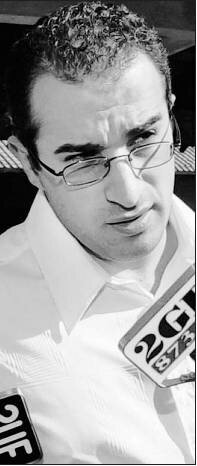 GOLD Coast businessman Ron Bakir has told convicted drug smuggler Schapelle Corby she owes him $500,000, her family says.
GOLD Coast businessman Ron Bakir has told convicted drug smuggler Schapelle Corby she owes him $500,000, her family says.
Mr Bakir denies the claim, saying if he is not repaid any money for his role in Corby's defence, "so be it."
Mr Bakir has been regarded as a 'White Knight', but Corby's mother, Rosleigh Rose has now questioned the motives and labelled him a 'Black Knight'.
The family was unaware the Australian Government had paid for the Indonesian lawyers at her daughter's Bali trial, because Mr Bakir took credit for bankrolling the case, Ms Rose said.
"Schapelle goes (to Ron): All that money?" Ms Rose told The Bulletin.
"He goes: Don't worry. You'll have plenty of time to pay me back when you get out.
- Click Here for Complete Story
- Click Here for Case Details & News Archive
- Schapelle’s case of stolen identity
- QCs left out of Corby appeal
- STAY CALM Schapelle Corby's plea to Australia
- Flood of 'Corby' charities concerns Qld Govt
- Bali court sentences Corby to 20 years in jail
- Transcript of Schapelle Corby Verdict
Hicks may have to wait for one more year
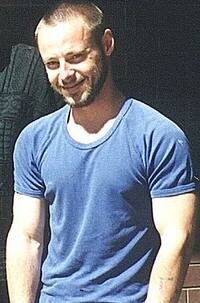 David Hicks is meeting his lawyers at the Guantanamo Bay prison in Cuba this weekend, to continue preparations for his defence.
David Hicks is meeting his lawyers at the Guantanamo Bay prison in Cuba this weekend, to continue preparations for his defence.
Hicks has been held at Guantanamo for more than three years and is the last prisoner there from countries that were part of the coalition that fought in the war in Afghanistan. He faces charges of conspiracy to attack civilians, attempted murder of coalition forces and aiding the enemy in Afghanistan.
The last of seven French prisoners were released in March, and five British prisoners left about the same time. All were freed on their return home.
With the outcome of legal challenges to the military commissions set up by the Bush Administration still to be decided, no one knows when Hicks - one of only four prisoners among 520 or so to be charged with specific offences - will get his day in court.
- Click Here for Complete Story
Click Here for Guantanamo Case Page
Death penalty urged for Australian
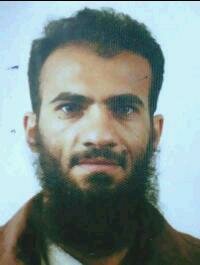 KUWAIT'S public prosecutor has called for the death penalty for an Australian man and 33 other suspected al-Qaeda-linked Islamic militants accused of involvement in deadly clashes with police.
KUWAIT'S public prosecutor has called for the death penalty for an Australian man and 33 other suspected al-Qaeda-linked Islamic militants accused of involvement in deadly clashes with police.
The request for death sentences against the militants, including Australian Talal Adrey, was made in the charge sheet at the trial, which opened in May and resumed yesterday amid tight security.
Most of the suspects are accused of involvement in four gunbattles with Kuwaiti security forces in January that left four police officers dead and 10 others wounded.
Eight militants were killed in the fighting, while Amer Khlaif al-Enezi, the alleged leader of the group, known as the "Peninsula Lions Brigade" and believed to be linked to Saudi militants and Osama bin Laden's al-Qaeda terrorist network, died in police detention eight days after his arrest in January.
Among the charges are joining an illegal extremist group, carrying out terrorist acts, participating in the killing of several policemen and plotting to attack US forces and citizens in the oil-rich Gulf emirate.
- Click Here for Complete Story
- Click Here for Tallaal Adrey Case Page
- Australians fear for man detained in Kuwait
- Turn Up Heat On Kuwait: Rudd
Plea for Australian who faces the firing squad
THE Federal Government will plead for the life of an Australian national sentenced to death in Vietnam for conspiring to smuggle heroin.
Vietnamese state-run radio announced yesterday the 46-year-old Victorian man of Vietnamese origin, Mai Cong Thanh, had been sentenced to death by firing squad.
He had been charged with conspiring with two other Australian nationals to take heroin from Vietnam to Australia.
Justice Minister Chris Ellison said he would be "pulling out all stops" to ensure the sentence was not carried out.
- Click Here for Complete Story
- Australian gets death sentence over drugs
- Govt to lobby against death penalty
- Death by firing squad for Australian
- Viets sentence Australian to death
- Australian national gets death penalty in Vietnam for drug trafficking
Lithgow man forgotten in an Argentine jail
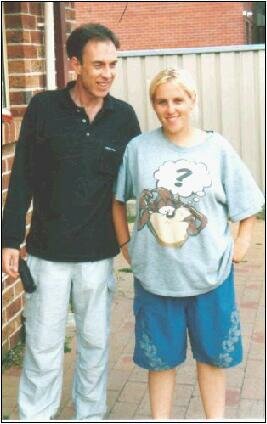 A Lithgow man is among a long list of Australians held for extended periods in foreign prisons while awaiting long delayed Court proceedings.
A Lithgow man is among a long list of Australians held for extended periods in foreign prisons while awaiting long delayed Court proceedings.
His details were included in a list published in the Sunday Age and Sydney Morning Herald in a wave of such revelations by lobbyists in the wake of the furore over the Schapelle Corby case in Indonesia and the calls for a prisoner exchange arrangement.
The Lithgow man was identified as 41 year old Stephen John Sutton who has been in jail in South America for more than two years.
- Click Here for complete News Update
- F.P.S.S News Update - Stephen John Sutton Case
- Read more about the Sutton case here.
Report on the 10th High Court Appeal Hearing.
 Tokyo June 9th 2005 The "Magic Key" Theory
Tokyo June 9th 2005 The "Magic Key" Theory
The excruciatingly long delays between court hearings that typify Japanese judicial procedure, have allowed defense council time to commission an independent report on photographs taken by customs officials on the day of Nick's arrest.
Tokyo High Court officials, in whose custody evidential articles are being retained, permitted the scanning of the original negatives of the suitcase by a digital imaging expert. The resulting data was then passed to a video expert for computer-enhancement. A reconstruction of the custom's photographs was also suggested. This reconstruction, using the original suitcase and its contents, was staged at the High Court at the end of May. (It is noteworthy that the prosecution obstructed the gathering of all the items to be used for the reconstruction, claiming that one item, a battery charger "...belonged to James.")
- Click Here for Complete Story
- Nick Baker case – key proves key to the defence
- Report on the 9th High Court Appeal Hearing
- Click Here for Nick Baker Case File & News Archive
Australian defence team meets Corby family
SCHAPELLE Corby's family has met two Australian barristers who have joined forces to assist her Indonesian legal team prepare its appeal against her 20- year sentence for drug smuggling.
After the meeting, in Bali, Corby's sister Mercedes said she and the family felt "much better about everything".
"We feel reassured," Ms Corby said after discussing her sister's case with Mark Trowell, QC, and Phillip Laskaris. Also present were Corby's father Michael and Mercedes' Balinese husband Wayan Widiartha.
The meeting helped dispel suggestions of rifts between the Indonesian legal team and the Perth barristers who were asked by the Australian Government to help with the appeal to the Denpasar High Court. Mr Trowell and Mr Laskaris plan to meet Corby today at Kerobokan Jail where she is being held. They said the Corby family was devastated about the extent of anti-Indonesian sentiment which has been displayed in Australia since the guilty finding and realised it was not helpful to Corby's case.
"It certainly doesn't reflect the views of Mercedes and her father who have just made that very clear to us," Mr Laskaris said.
- Click Here for Archive of this release
Click Here for the Schapelle Corby Case Page
Nick Baker case – key proves key to the defence
 Nick Baker, a British prisoner unfairly convicted in Japan on drug smuggling charges, will have his appeal hearing on Wednesday 9th June 2005 at 2pm local time, at the Tokyo High Court. It is hoped that this will the last hearing before the summing up.
Nick Baker, a British prisoner unfairly convicted in Japan on drug smuggling charges, will have his appeal hearing on Wednesday 9th June 2005 at 2pm local time, at the Tokyo High Court. It is hoped that this will the last hearing before the summing up.
In a positive development, the new judge presiding over the case last week gave Nick’s defence lawyer, Mr Miyake, permission to reconstruct the suitcase and its contents in order to prove that the key had been in a pocket in the suitcase all along and that the customs officials had lied. Customs officials had earlier said that Nick had had the key on his person and had tossed it into the case. Had this been true, it would have indicated that the case was his.
Baroness Sarah Ludford MEP, Liberal Democrat European justice spokesperson who has campaigned since 2002 on behalf of Nick Baker and flew to Tokyo in 2003 with Sabine Zanker of Fair Trials Abroad in the attempt to get him a fair trial, said:
“Only now following a change of judge, and after 3 years of injustice, is the defence being given the chance to expose the original lies of the custom officials.” "This gives me hope that justice will finally be done, but it is a long and debilitating haul for Nick and his family.".
- Click Here for Complete Story
- Report on the 9th High Court Appeal Hearing
- Click Here for Nick Baker Case File & News Archive
Freedom for the Lao-Hmong guides of Thierry FALISE et Vincent REYNAUD
Two years ago, day for day in June 2003, two European journalists, Thierry FALISE from Belgium and Vincent REYNAUD from France, their Lao-American interpreter Naw-Karl MUA, as well as their three Lao-Hmong guides --Mr. Tho MOUA, Mr. Pa Fue KHANG and Mr. Va Cha YANG-were arrested by the authorities of the Lao People's Democratic Republic (LPDR) for visiting Lao-Hmong groups hunted down by the governmental troups in the Xaysomboun Special Zone, for press coverage purposes.
Following international pressure, both European journalists and their Lao-American journalists were expelled from the LPDR in July 9, 2003, after having been sentenced to prison and fines by a 'people's tribunal' in the course of a mockery of a trial. However, 730 days after their arrest, the three Lao-Hmong guides are still kept in the LPDR prisons.
- Click Here for Complete Story
Laos Deports Hmong Activists From U.S.
 BANGKOK, Thailand - The Laotian government released three of four U.S. activists detained after witnessing the surrender of Hmong rebels — Vietnam War-era allies of the United States — and deported them Monday to Thailand, one of the freed activists said.
BANGKOK, Thailand - The Laotian government released three of four U.S. activists detained after witnessing the surrender of Hmong rebels — Vietnam War-era allies of the United States — and deported them Monday to Thailand, one of the freed activists said.
Ed Szendrey of Oroville, Calif., who was released along with his wife, Georgie, and Hmong-American Nhia Yang, told The Associated Press he was elated at being freed but concerned for Hmong- American Sia Cher Vang, the group's driver, who remained in jail.
The three were freed by Laotian authorities Monday afternoon in the capital, Vientiane, and escorted across the nearby border with Thailand by U.S. consular officials.
- Click Here for Complete Story
To be so helpless is what tortures your mind
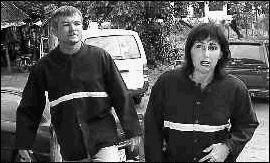 Kay Danes knows first-hand what Schapelle Corby is going through, writes CINDY WOCKNER in Bali
Kay Danes knows first-hand what Schapelle Corby is going through, writes CINDY WOCKNER in Bali
One week ago, as Kay Danes sat in the Denpasar District Court and watched the extraordinary drama as Schapelle Corby was declared guilty, it all came flooding back to her.
She was one of the few people in the crowded room who really knew how Corby was feeling at that terrible moment.
Four years earlier, the 37-year-old Brisbane woman and her husband Kerry sat in a court in Laos and listened as the couple were convicted, after a four-hour trial during which they could not even present a defence case, of embezzlement, tax evasion and gem smuggling and sentenced to seven years' jail.
"Everything just flashed back,'' she says. "Mine was a similar scene, three judges sitting in front, that feeling when all you can do is look and shake your head.'' "You can't do anything, you can't change anything,'' Danes says of observing at close quarters the conviction of another woman by a foreign court system.
- Click Here for Complete Story
46 Aussies on drugs charges in Asian jails
ACROSS Southeast Asia, 46 Australians are languishing in prison cells on drug-trafficking charges, with little prospect of attracting the same support as Schapelle Corby.
The Department of Foreign Affairs said yesterday that three Australians were on death row after being convicted of narcotics offences in Asia.
Vietnam, which has some of the world's toughest anti-drug laws, last year sentenced an Australian man to death by firing squad for heroin trafficking.
- Click Here for Complete Story
Australian officials seek Indonesia prisoner swap pact
Sydney (DPA): Australian officials are expected to arrive on Monday in Indonesia to start negotiations on a prisoner exchange agreement that would allow convicted drug smuggler Schapelle Corby to serve her 20-year sentence in a jail in her homeland, news reports said.
Indonesia last week rejected a one-off deal to have the 27-year-old former beautician, who was found guilty last month of smuggling 4.1 kilograms of cannabis into Bali, pass her time in an Australian prison.
Bruce Billson, parliamentary secretary for foreign affairs, is going to Indonesia with a parliamentary delegation and told reporters that the government was optimistic that a wider prisoner swap pact could be reached, the national news agency AAP reported.
Billson said that he hoped to meet senior Indonesian ministers as well as other legislators during the delegation's visit to Jakarta.
"It would be a good opportunity to make the point that there are 30 Indonesians in Australian jails for federal offenses, and there's 14 Australians in Indonesian jails, mainly for drug-related offenses," he said.
- Click Here for Complete Story
Corby Verdict - The Fall Out (Stephen John Sutton)
 Australian Consular officials have met with Stephen John Sutton on June 3, 2005.
Australian Consular officials have met with Stephen John Sutton on June 3, 2005.
Elizabeth Cluse has given FPSS permission to release this latest information.
Report:
Mr Sutton was well and feeling better than in previous visits. He said his back problem is much better now and he is not taking any medication at all. We were also able to confirm that his interview with the defender had taken place in March. Mr Sutton said that he had been advised by prison officers that his hearing will take place on the 6th July ( we will confirm this with his defender). Mr Sutton asked if the following message could be passed to his family: "I think of them all. Love them." We also confirmed that his family is in contact with Consular Operations.
- Stephen John Sutton Case Information
- Corby Verdict - The Fall Out (Stephen John Sutton)
Vietnam sentences Australian to 20 years for drug trafficking
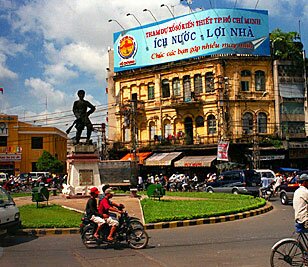 An Australian man was sentenced to 20 years in a Vietnamese prison for trafficking heroin, a court official said Friday.
An Australian man was sentenced to 20 years in a Vietnamese prison for trafficking heroin, a court official said Friday.
Tony Tran, 43, from New South Wales, was convicted Wednesday of trafficking 150 grams (0.33 pounds) of heroin from Vietnam to Australia, said presiding judge Vu Xuan Hai.
Tran's Vietnamese girlfriend, Le Thi Van, 33, received 15 years in prison on the same charges at the end of the two-day trial in Phu Yen province, some 550 kilometers (342 miles) northeast of Ho Chi Minh City, he said.
The two were arrested in May 2004 after they were caught mailing 15 packages of heroin stuffed between photos to Australia from Vietnam, the judge said.
In Vietnam, possessing, trading or trafficking 600 grams (1.32 pounds) of heroin or 20 kilograms (44 pounds) of opium is punishable by death or life in prison.
- Click Here for Complete Story
- Man gets 20 years for sending heroin in letters
- Heroin smuggler gets 20 years
Death penalty returns to Iraq, with a vengeance
 BAGHDAD (AFP) - With four death sentences handed down within the space of days, judicial executions are set to return to Iraq where the authorities are desperate for a deterrent to halt rampant insurgent attacks.
BAGHDAD (AFP) - With four death sentences handed down within the space of days, judicial executions are set to return to Iraq where the authorities are desperate for a deterrent to halt rampant insurgent attacks.
Seven convicted Iraqi criminals and insurgents are currently on death row and although the sentences have yet to be carried out, the interior ministry have vowed that the first hangings will take place next month.
While the looming prospect of executions is worrying human rights groups, the government insists it has no alternative. "We must maintain order and dissuade criminals and terrorists," said government spokesman Leith Kubba.
The death sentence was widely practised under now imprisoned former dictator Saddam Hussein, who himself could face the death penalty if he is ultimately found guilty of charges of crimes against humanity.
Capital punishment was suspended by the former US military commander in Iraq, General Tommy Franks, soon after the invasion, before being reinstated in June last year by the unelected interim Iraqi government.
Three common law criminals were sentenced to death in Karbala, southern Iraq, a month later for the murder of relatives, but the sentences have yet to be carried out.
On May 21 however, Interior Minister Bayan Baqer Solagh ended uncertainty over the use of the death penalty when he said it was "still applicable" and would be rigorously applied.
Since Iraq's first elected government took office in late March, judges have ordered that four men be executed for their crimes.
- Click Here for Complete Story
Photos and information archived from services named where possible for information and historical non profit use only. -
NEWS ARCHIVES 02- NEWS ARCHIVES 03- NEWS ARCHIVES 04
|
RECENT NEWS ARCHIVES
|
|
CLICK HERE TO RETURN TO THE NEWS PAGE
|
| PRISONERS/PRISONS| EXPERIENCES| BOOKS/PRODUCTS| HOW TO HELP| NEWS| EMAIL
|
FREEDOM IS A RIGHT OF ALL HUMAN BEINGS IN A WORLD WHERE LIFE IS VALUED AND PEACE MAY FINALLY BE A POSSABILITY
|
|
|
|
|
CAMPAIGNS
|
|
HOME
|

|
|
Just in case you forgot - read the
Universal declaration of Human Rights
|
Copyright - An important message to website owners:
All information at this site is © Copyright 1996 - 2007 'Save-A-Life' , 'Foreign Prisoner Support Service' & 'ForeignPrisoners.com' unless stated otherwise. As with all our information AND more specifically, information relating to CAMPAIGNS AND/OR PRISONERS we have been granted special permission to disclose this type of information by the families and/or by the detainee themselves. Therefore, if you wish to use any of this information to re-create in your own website or elsewhere, please contact us - save breach of copyright. News stories are reprinted for archival, news reporting and information use only and are credit where possible.
Click here for the legal stuff
|
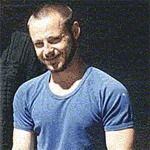 TONY EASTLEY: As Australian terror suspect David Hicks begins his fifth year in detention at Guantanamo Bay, his Australian lawyer's latest attempt to travel to Cuba has been rejected.
TONY EASTLEY: As Australian terror suspect David Hicks begins his fifth year in detention at Guantanamo Bay, his Australian lawyer's latest attempt to travel to Cuba has been rejected.
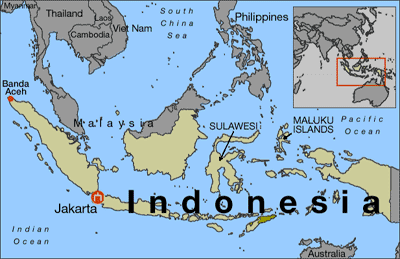 AUSTRALIA and Indonesia are poised to sign a landmark security treaty, according to Indonesian government sources.
AUSTRALIA and Indonesia are poised to sign a landmark security treaty, according to Indonesian government sources.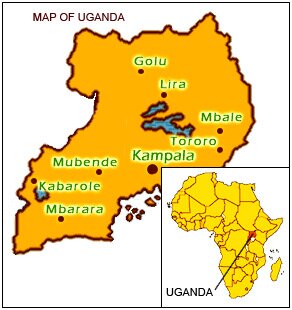 An Australian cardiologist committed to stand trial in Uganda over his wife's murder is again seeking bail.
An Australian cardiologist committed to stand trial in Uganda over his wife's murder is again seeking bail.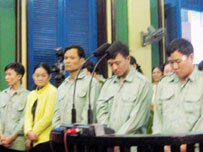 The Ho Chi Minh City People’s Court sentenced Friday eight people to death and nine others to life terms for smuggling 78 kg of heroin in what is considered the largest drugs case in southern Vietnam.
The Ho Chi Minh City People’s Court sentenced Friday eight people to death and nine others to life terms for smuggling 78 kg of heroin in what is considered the largest drugs case in southern Vietnam.
 A KUWAITI court has sentenced an Australian man to four years' jail for terrorist-related offences linked to bloody attacks in the country in January.
A KUWAITI court has sentenced an Australian man to four years' jail for terrorist-related offences linked to bloody attacks in the country in January.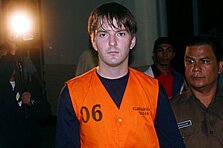 An Indonesian court has sentenced Australian Graham Payne to nine months in prison for possessing small amounts of crystal methamphetamine and heroin.
An Indonesian court has sentenced Australian Graham Payne to nine months in prison for possessing small amounts of crystal methamphetamine and heroin.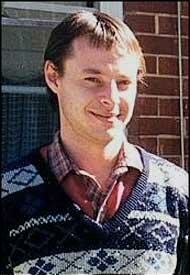 TER ROR suspect David Hicks isn't confident his British citizenship will secure his release from detention at Guantanamo Bay, his father said today. The British Government said today it would appeal a British High Court ruling two weeks ago in which a judge ruled there was "no power in law" to deprive Adelaide-born Hicks of British citizenship.
TER ROR suspect David Hicks isn't confident his British citizenship will secure his release from detention at Guantanamo Bay, his father said today. The British Government said today it would appeal a British High Court ruling two weeks ago in which a judge ruled there was "no power in law" to deprive Adelaide-born Hicks of British citizenship.
 An Australian man of Vietnamese origin has been sentenced to death for trafficking heroin in southern Vietnam, a court official says.
An Australian man of Vietnamese origin has been sentenced to death for trafficking heroin in southern Vietnam, a court official says.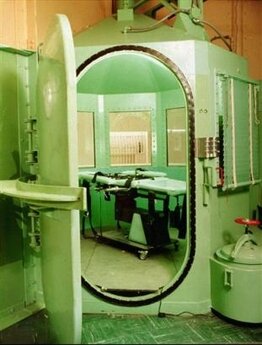 How much is a condemned killer's life worth?
How much is a condemned killer's life worth? California - United States authorities on Tuesday executed Stanley "Tookie" Williams, a convicted killer who was at the centre of one of biggest anti-death penalty campaigns in the United States in decades, a spokesperson for San Quentin prison said.
California - United States authorities on Tuesday executed Stanley "Tookie" Williams, a convicted killer who was at the centre of one of biggest anti-death penalty campaigns in the United States in decades, a spokesperson for San Quentin prison said.
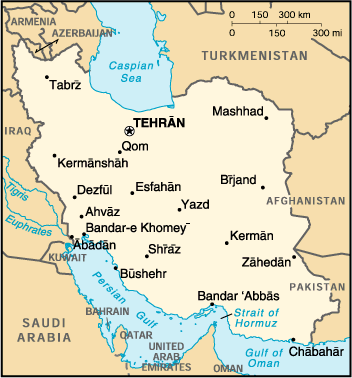 Rostam Tajik was publicly executed on 10 December in a park in the city of Esfahan, central Iran.
Rostam Tajik was publicly executed on 10 December in a park in the city of Esfahan, central Iran.
 MOSCOW — A 13-year-old boy was arrested at a Moscow airport yesterday after stepping off a plane from Tajikistan with 840g of heroin hidden in his stomach, Russian customs officials said.
MOSCOW — A 13-year-old boy was arrested at a Moscow airport yesterday after stepping off a plane from Tajikistan with 840g of heroin hidden in his stomach, Russian customs officials said.
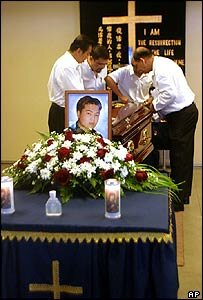


 Laos (FFC) Lao military forces continue to use forced starvation as a weapon against the U.S. Secret veterans and their families in the remote mountains of Laos. Their future remains uncertain.
Laos (FFC) Lao military forces continue to use forced starvation as a weapon against the U.S. Secret veterans and their families in the remote mountains of Laos. Their future remains uncertain.
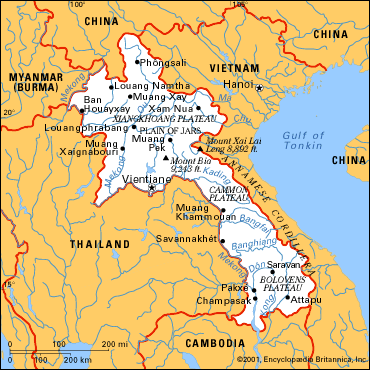 It has been nearly two months to the day that 27 Hmong refugees – one adult and 26 teenagers aged 13 to 16—who were taken in by the provisional displaced persons settlement of Ban Houai Nam Khao (Phetchaboun province, Thailand), were expelled by the Thai authorities and sent back to Laos, according to concordant information received by the Lao Movement for Human Rights (LMHR).
It has been nearly two months to the day that 27 Hmong refugees – one adult and 26 teenagers aged 13 to 16—who were taken in by the provisional displaced persons settlement of Ban Houai Nam Khao (Phetchaboun province, Thailand), were expelled by the Thai authorities and sent back to Laos, according to concordant information received by the Lao Movement for Human Rights (LMHR). AN Australian nurse held in Italy on drug smuggling charges is expected to face court next month, her lawyer has revealed.
AN Australian nurse held in Italy on drug smuggling charges is expected to face court next month, her lawyer has revealed.

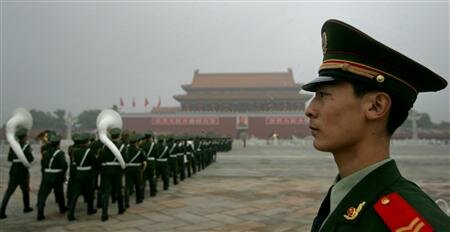


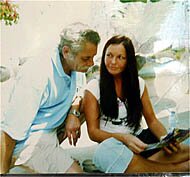
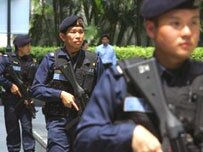
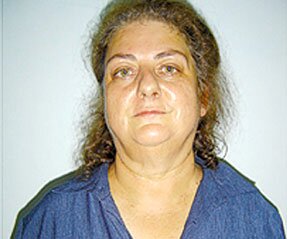 AN expatriate Australian teacher arrested in Mauritius was likely to be charged if authorities believed the drug claims against her could be substantiated, Foreign Minister Alexander Downer said today.
AN expatriate Australian teacher arrested in Mauritius was likely to be charged if authorities believed the drug claims against her could be substantiated, Foreign Minister Alexander Downer said today.
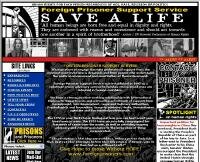
 A New Zealander has been arrested in Thailand for allegedly attempting to smuggle heroin into Phuket on a yacht.
A New Zealander has been arrested in Thailand for allegedly attempting to smuggle heroin into Phuket on a yacht.
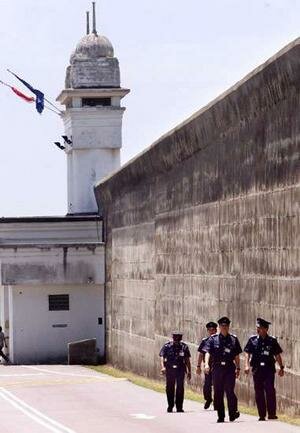 The imminent hanging - barring an unexpected miracle of Singaporean clemency - of the young Australian Nguyen Tuong Van is a horrible and sad human tragedy. But it's more than that.
The imminent hanging - barring an unexpected miracle of Singaporean clemency - of the young Australian Nguyen Tuong Van is a horrible and sad human tragedy. But it's more than that.
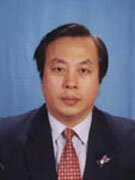 Amnesty International and the UK-based SilverSurfers.net organisation have joined forces to launch a new online appeal for a Vietnamese man imprisoned for 12 years for using the internet.
Amnesty International and the UK-based SilverSurfers.net organisation have joined forces to launch a new online appeal for a Vietnamese man imprisoned for 12 years for using the internet.
 Convicted drug user Michelle Leslie has spoken publicly after her release from a Bali jail yesterday. The South Australian model is expected to arrive back in Australia today.
Convicted drug user Michelle Leslie has spoken publicly after her release from a Bali jail yesterday. The South Australian model is expected to arrive back in Australia today.
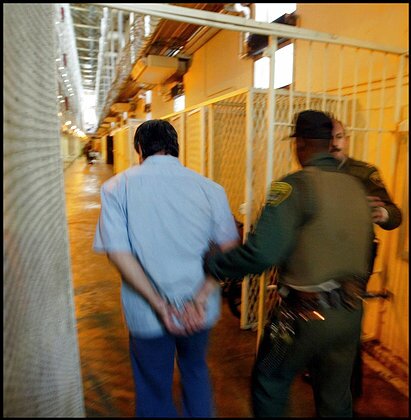 The ranks of people sentenced to death and the number executed declined in 2004 as the nation's death row population kept shrinking, the government reported yesterday.
The ranks of people sentenced to death and the number executed declined in 2004 as the nation's death row population kept shrinking, the government reported yesterday.
 The Federal Government has admitted its blunt assertion that 14 Kurdish boat people had not sought asylum was wrong and should never have been made.
The Federal Government has admitted its blunt assertion that 14 Kurdish boat people had not sought asylum was wrong and should never have been made.
 A guard from the adult prison service locks the door on the punishment cell in the Vila Maria juvenile detention centre, São Paulo, Brazil, 2005 © Promotoria de Justiça da Infância e da Juventude de São Paulo – Setor de Execuções
A guard from the adult prison service locks the door on the punishment cell in the Vila Maria juvenile detention centre, São Paulo, Brazil, 2005 © Promotoria de Justiça da Infância e da Juventude de São Paulo – Setor de Execuções
 After 12 months of broken promises and shattered dreams, Schapelle Corby reveals why she still believes in miracles. Paul Toohey reports.
After 12 months of broken promises and shattered dreams, Schapelle Corby reveals why she still believes in miracles. Paul Toohey reports.
 The United Nations reports the government of Burma continues to imprison more than 1,100 (eleven hundred) political prisoners, including Nobel peace laureate and pro-democracy leader, Aung San Suu Kyi.
The United Nations reports the government of Burma continues to imprison more than 1,100 (eleven hundred) political prisoners, including Nobel peace laureate and pro-democracy leader, Aung San Suu Kyi.
 Nine days before nine young Australians were arrested in a heroin smuggling sting in Bali, Australian police knew almost everything: who they were, where they would stay, when they would try to leave, even how they would strap the drugs to their bodies.
Nine days before nine young Australians were arrested in a heroin smuggling sting in Bali, Australian police knew almost everything: who they were, where they would stay, when they would try to leave, even how they would strap the drugs to their bodies.
 TRIBESMAN (Translation): Today the Lao government is trying to use starvation as a weapon to kill us. They are also using chemicals to kill us.
TRIBESMAN (Translation): Today the Lao government is trying to use starvation as a weapon to kill us. They are also using chemicals to kill us.
 Torture is never acceptable and evidence extracted under torture should never be admissible in UK courts, except in proceedings against the alleged torturer, said Amnesty International today (17 October) as the UK Law Lords began their considerations on the issue.
Torture is never acceptable and evidence extracted under torture should never be admissible in UK courts, except in proceedings against the alleged torturer, said Amnesty International today (17 October) as the UK Law Lords began their considerations on the issue.
 • Close Guantánamo Bay: shut down the detention camp, charge the detainees under US law in US courts or release them.
• Close Guantánamo Bay: shut down the detention camp, charge the detainees under US law in US courts or release them. SOUTH America has become the focus of the hunt for one of two Sydney cocaine kingpins believed to have fled the country. Investigators believe Les Mara - one of the principals of a plot to smuggle in 20kg of cocaine through Sydney airport early this year - is hiding in Rio de Janeiro.
SOUTH America has become the focus of the hunt for one of two Sydney cocaine kingpins believed to have fled the country. Investigators believe Les Mara - one of the principals of a plot to smuggle in 20kg of cocaine through Sydney airport early this year - is hiding in Rio de Janeiro.
 MODEL Michelle Leslie emerged from underneath her now-familiar headscarf as she was led in for questioning by Indonesian prosecutors yesterday.
MODEL Michelle Leslie emerged from underneath her now-familiar headscarf as she was led in for questioning by Indonesian prosecutors yesterday.
 INDONESIA has moved the three ringleaders of the 2002 Bali bombings on death-row because of security concerns at their prison in Denpasar.
INDONESIA has moved the three ringleaders of the 2002 Bali bombings on death-row because of security concerns at their prison in Denpasar.
 Moua is one of the many Hmong former Special Guerrilla Unit [SGU] members who fought for democracy in the "Laos Secret War" up until the communists seized control of the landlocked country in around 1975.
Moua is one of the many Hmong former Special Guerrilla Unit [SGU] members who fought for democracy in the "Laos Secret War" up until the communists seized control of the landlocked country in around 1975.
 Amnesty International has learnt today that the Sudanese Government has launched legal proceedings against one of the country's leading human rights groups Sudan Organisation Against Torture (SOAT) in apparent attempt to silence the organisation.
Amnesty International has learnt today that the Sudanese Government has launched legal proceedings against one of the country's leading human rights groups Sudan Organisation Against Torture (SOAT) in apparent attempt to silence the organisation.
 BEIJING, October 5, (Toronto) Globe and Mail [from The Economist] -- With commendable patience China awaits 2004. The talk in Beijing is that its next bid for the Olympic Games must surely be successful. Losing the 2000 Games to Sydney was indeed painful, but for a country that often reminds the rest of the world that Chinese civilization has been continuous for more than 3,000 years, the 10 years to the next Games can easily be endured.
BEIJING, October 5, (Toronto) Globe and Mail [from The Economist] -- With commendable patience China awaits 2004. The talk in Beijing is that its next bid for the Olympic Games must surely be successful. Losing the 2000 Games to Sydney was indeed painful, but for a country that often reminds the rest of the world that Chinese civilization has been continuous for more than 3,000 years, the 10 years to the next Games can easily be endured.
 Australian Mercedes Corby said she had seen Australians with shrapnel wounds, broken bones, horrific burns and eye wounds after the latest Bali bombings.
Australian Mercedes Corby said she had seen Australians with shrapnel wounds, broken bones, horrific burns and eye wounds after the latest Bali bombings.
 THE alleged ringleaders of the Bali Nine, all of whom face the death penalty on narcotics and conspiracy charges, will be tried by members of the same three-man bench that sent Schapelle Corby to jail for 20 years for drug-running.
THE alleged ringleaders of the Bali Nine, all of whom face the death penalty on narcotics and conspiracy charges, will be tried by members of the same three-man bench that sent Schapelle Corby to jail for 20 years for drug-running.
 Bali Nine man Tach Duc Thanh Nguyen, of Wellington Point, is expected to face trial for alleged heroin trafficking within a fortnight. The 22-year-old was detained in Indonesia more than five months ago with eight other young adults for allegedly attempting to export the narcotic into Australia.
Bali Nine man Tach Duc Thanh Nguyen, of Wellington Point, is expected to face trial for alleged heroin trafficking within a fortnight. The 22-year-old was detained in Indonesia more than five months ago with eight other young adults for allegedly attempting to export the narcotic into Australia.
 An Adelaide man accused of drug possession in Indonesia is facing 20 years in jail, police say.
An Adelaide man accused of drug possession in Indonesia is facing 20 years in jail, police say.
 Australian terror suspect David Hicks will be dodging justice if he gets out of Guantanamo Bay via British citizenship, Foreign Minister Alexander Downer says.
Australian terror suspect David Hicks will be dodging justice if he gets out of Guantanamo Bay via British citizenship, Foreign Minister Alexander Downer says.
 Human rights lawyer Clive Stafford-Smith talks to AI about his experiences inside the notorious US detention centre at Guantánamo Bay, Cuba
Human rights lawyer Clive Stafford-Smith talks to AI about his experiences inside the notorious US detention centre at Guantánamo Bay, Cuba
 LAO refugees call her "Nang", Sister Kay, a term of reverence for someone toiling to "open the ear of the world" to their suffering.
LAO refugees call her "Nang", Sister Kay, a term of reverence for someone toiling to "open the ear of the world" to their suffering.
 The wife of an Australian heroin trafficker who has had his death penalty in Vietnam commuted to life in prison says she is relieved but sad that he may never see their children again.
The wife of an Australian heroin trafficker who has had his death penalty in Vietnam commuted to life in prison says she is relieved but sad that he may never see their children again.
 Heralded as a hero, he's since landed hard -- and far -- from the Canadian idol he once was.
Heralded as a hero, he's since landed hard -- and far -- from the Canadian idol he once was. On Tuesday morning August 9, Military Court Judge General Nay Thol sentenced opposition Law maker Cheam Channy to 7 years imprisonment on charges of organizing illegal armed forces and committing fraud, despite lack of credible testimony or evidence to back up charges.
On Tuesday morning August 9, Military Court Judge General Nay Thol sentenced opposition Law maker Cheam Channy to 7 years imprisonment on charges of organizing illegal armed forces and committing fraud, despite lack of credible testimony or evidence to back up charges. In South Korea, committing adultery or breaking a promise to marry someone can land the transgressor in the dock. By the same token, there is a good chance that anyone who breaches foreign currency controls or becomes involved in a contractual dispute will end up with a criminal conviction.
In South Korea, committing adultery or breaking a promise to marry someone can land the transgressor in the dock. By the same token, there is a good chance that anyone who breaches foreign currency controls or becomes involved in a contractual dispute will end up with a criminal conviction. David Hicks, the Australian imprisoned at the US Base of Guantanamo Bay, will be 30 years old this coming Monday August 7, 2005.
David Hicks, the Australian imprisoned at the US Base of Guantanamo Bay, will be 30 years old this coming Monday August 7, 2005. Australia has backed a crackdown on tourists who flout Indonesia's drug laws after Bali police said they would force travellers to undergo random urine tests at clubs and rave parties.
Australia has backed a crackdown on tourists who flout Indonesia's drug laws after Bali police said they would force travellers to undergo random urine tests at clubs and rave parties. SENTENCED to serve 13 years in a squalid Cambodian jail for drug trafficking, Sydney teenager Gordon Vuong sleeps on concrete, misses his mother and wants John Howard to help bring him home.
SENTENCED to serve 13 years in a squalid Cambodian jail for drug trafficking, Sydney teenager Gordon Vuong sleeps on concrete, misses his mother and wants John Howard to help bring him home. AMERICAN peace activist Scott Parkin arrived back in the US today after spending five days in a Melbourne jail as a "national security risk".
AMERICAN peace activist Scott Parkin arrived back in the US today after spending five days in a Melbourne jail as a "national security risk". On the front page of the 1.5cm thick dossier is a head and shoulders mug shot of Leslie taken recently by police, since she began wearing a black Muslim burqa-style headcovering.
On the front page of the 1.5cm thick dossier is a head and shoulders mug shot of Leslie taken recently by police, since she began wearing a black Muslim burqa-style headcovering. Indonesian prosecutors are confident that a Bali appeals court will increase Schapelle Corby's 20-year jail term to life imprisonment.
Indonesian prosecutors are confident that a Bali appeals court will increase Schapelle Corby's 20-year jail term to life imprisonment. The indigenous peoples of Cambodia have been holding a forum to discuss the threat to traditional territory posed by incomers and land speculators.
The indigenous peoples of Cambodia have been holding a forum to discuss the threat to traditional territory posed by incomers and land speculators. ESCUINTLA, Guatemala - Gang members staged simultaneous riots in at least seven Guatemalan prisons on Monday, attacking rivals with grenades, guns and knives in coordinated chaos that left 31 inmates dead, officials said.
ESCUINTLA, Guatemala - Gang members staged simultaneous riots in at least seven Guatemalan prisons on Monday, attacking rivals with grenades, guns and knives in coordinated chaos that left 31 inmates dead, officials said. In an Australian first, human rights campaigner Kay Danes and Terry Hicks, father of Guantanamo Bay detainee, David Hicks, will present the inside story of their personal dealings with overseas justice systems at Conrad Jupiters on Friday 26th August.
In an Australian first, human rights campaigner Kay Danes and Terry Hicks, father of Guantanamo Bay detainee, David Hicks, will present the inside story of their personal dealings with overseas justice systems at Conrad Jupiters on Friday 26th August. Australia's longest serving immigration detainee, Peter Qasim, says he is very happy to be released after seven years in detention.
Australia's longest serving immigration detainee, Peter Qasim, says he is very happy to be released after seven years in detention. Hundreds of inmates have slashed their bodies with razor blades to protest mistreatment and beatings by guards at a prison camp in the city of Lgov, 500 kilometers south of Moscow. The prison director and his two deputies were sacked on 4 July after an investigation backed the inmates' claims of abuse. The unprecedented mass mutilation has outraged human rights groups and drawn attention to the nightmarish conditions that plague many Russian prisons.
Hundreds of inmates have slashed their bodies with razor blades to protest mistreatment and beatings by guards at a prison camp in the city of Lgov, 500 kilometers south of Moscow. The prison director and his two deputies were sacked on 4 July after an investigation backed the inmates' claims of abuse. The unprecedented mass mutilation has outraged human rights groups and drawn attention to the nightmarish conditions that plague many Russian prisons. Sen. Mark Dayton and Wisconsin's two senators want Secretary of State Condoleezza Rice to send an independent intermediary to Laos to monitor the country's treatment of Hmong refugees.
Sen. Mark Dayton and Wisconsin's two senators want Secretary of State Condoleezza Rice to send an independent intermediary to Laos to monitor the country's treatment of Hmong refugees. GOLD Coast businessman Ron Bakir has told convicted drug smuggler Schapelle Corby she owes him $500,000, her family says.
GOLD Coast businessman Ron Bakir has told convicted drug smuggler Schapelle Corby she owes him $500,000, her family says. David Hicks is meeting his lawyers at the Guantanamo Bay prison in Cuba this weekend, to continue preparations for his defence.
David Hicks is meeting his lawyers at the Guantanamo Bay prison in Cuba this weekend, to continue preparations for his defence. A Lithgow man is among a long list of Australians held for extended periods in foreign prisons while awaiting long delayed Court proceedings.
A Lithgow man is among a long list of Australians held for extended periods in foreign prisons while awaiting long delayed Court proceedings. Tokyo June 9th 2005 The "Magic Key" Theory
Tokyo June 9th 2005 The "Magic Key" Theory BANGKOK, Thailand - The Laotian government released three of four U.S. activists detained after witnessing the surrender of Hmong rebels — Vietnam War-era allies of the United States — and deported them Monday to Thailand, one of the freed activists said.
BANGKOK, Thailand - The Laotian government released three of four U.S. activists detained after witnessing the surrender of Hmong rebels — Vietnam War-era allies of the United States — and deported them Monday to Thailand, one of the freed activists said. Kay Danes knows first-hand what Schapelle Corby is going through, writes CINDY WOCKNER in Bali
Kay Danes knows first-hand what Schapelle Corby is going through, writes CINDY WOCKNER in Bali Australian Consular officials have met with Stephen John Sutton on June 3, 2005.
Australian Consular officials have met with Stephen John Sutton on June 3, 2005. An Australian man was sentenced to 20 years in a Vietnamese prison for trafficking heroin, a court official said Friday.
An Australian man was sentenced to 20 years in a Vietnamese prison for trafficking heroin, a court official said Friday. BAGHDAD (AFP) - With four death sentences handed down within the space of days, judicial executions are set to return to Iraq where the authorities are desperate for a deterrent to halt rampant insurgent attacks.
BAGHDAD (AFP) - With four death sentences handed down within the space of days, judicial executions are set to return to Iraq where the authorities are desperate for a deterrent to halt rampant insurgent attacks.


